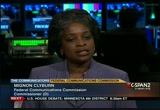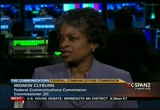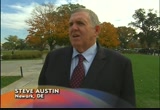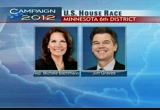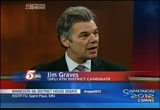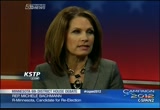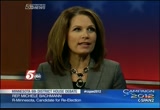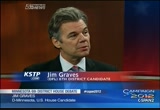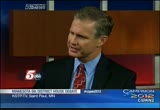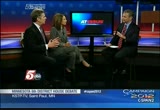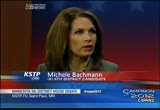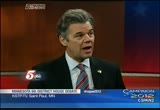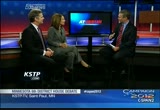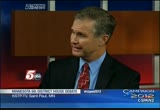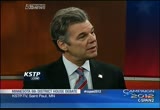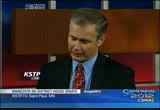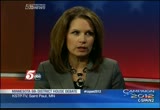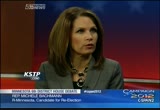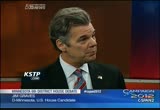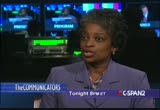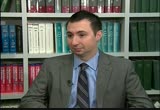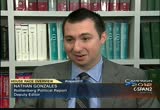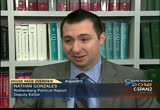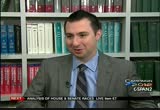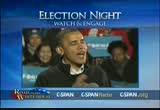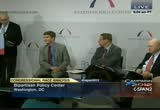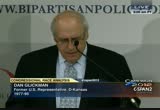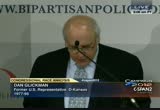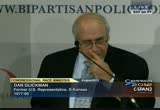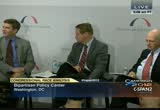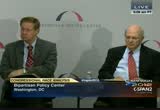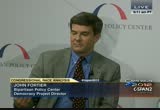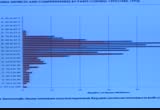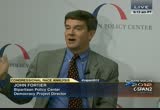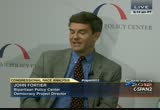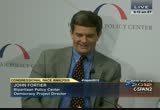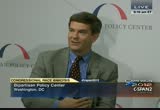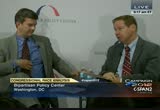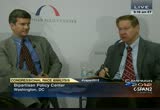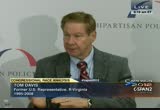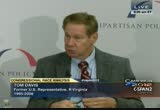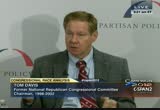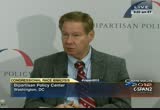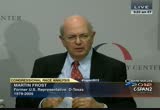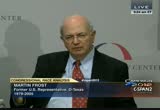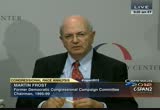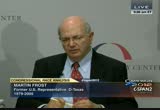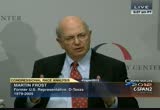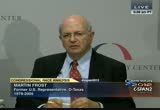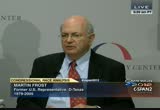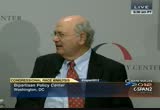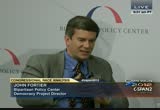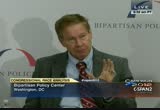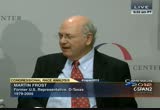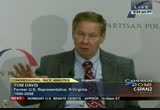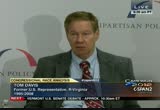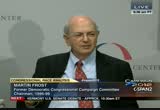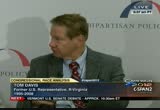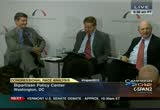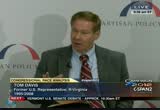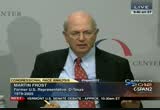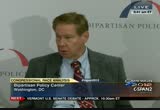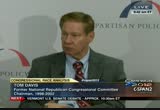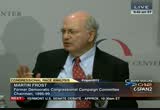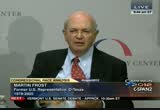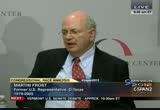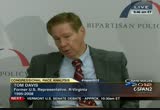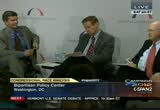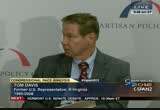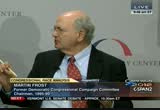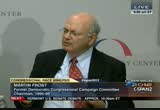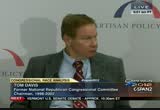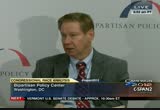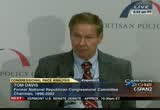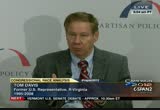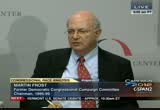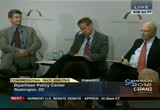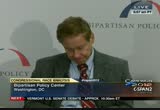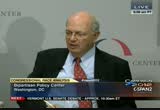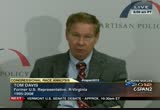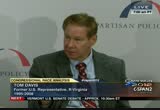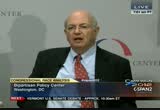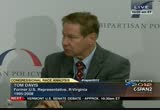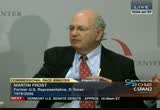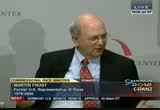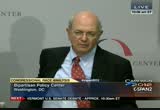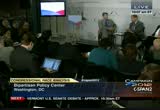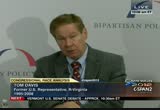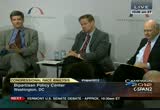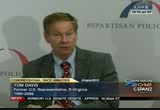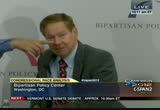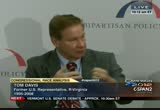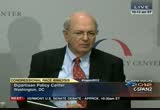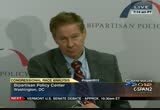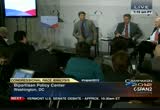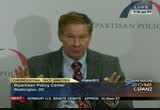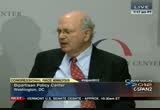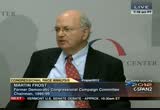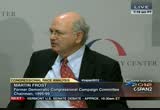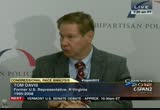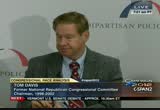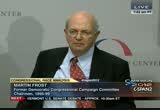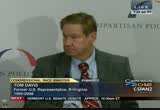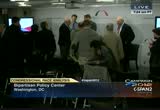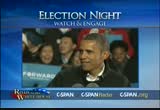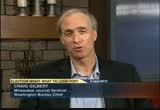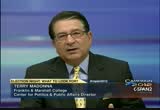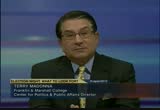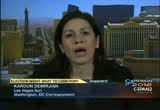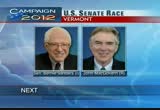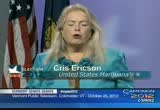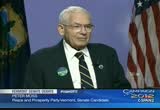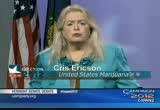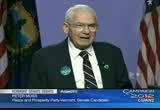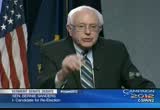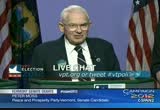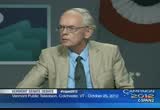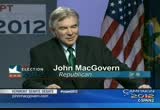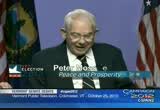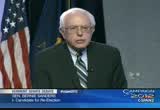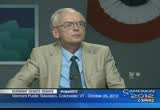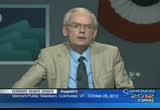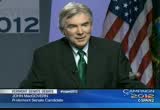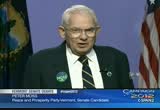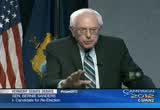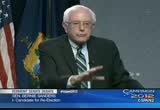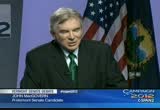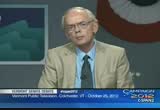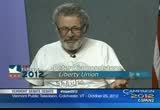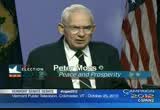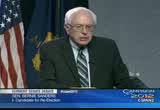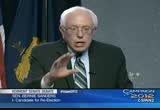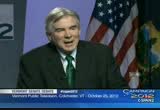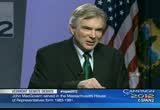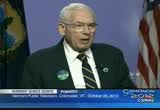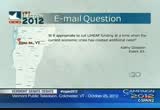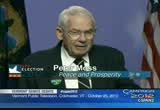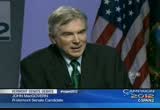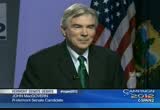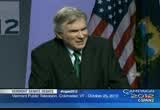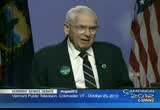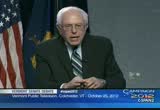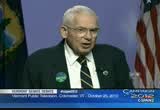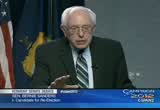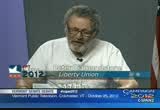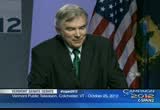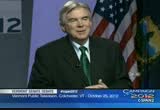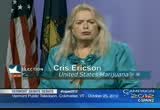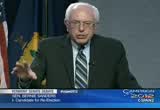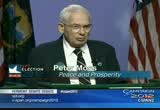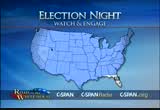tv U.S. Senate CSPAN November 5, 2012 8:30am-12:00pm EST
8:30 am
are the critical communications needs that must be met, decisions that must be made that the fcc will continue to do. um, we will have a couple of days off, but thanks give withing -- thank giving for christmas and maybe one or two off for the new year. but outside of that the work continues in terms of serving the public and continuing to meet the critical needs of this nation. >> host: do you foresee a hearing on sandy and its effects? >> guest: i anticipate that -- i'm not sure if it would be necessarily at the federal level, but i know in terms of this -- i'm pretty confident that, and i was a state commissioner, that there will be some ais accessments minimally on a state-by-state level in terms of, again, looking at, um, what was done and looking at and evaluating and making pronouncements as to what we can do better. so there will be hearings, i'm not sure if it's going to
8:31 am
escalate to the federal level. >> host: minion clyburn -- mignon clyburn and paul kirby, this is "the communicators" on c-span. >> tomorrow night watch the election results from the presidential campaign along with key contests in house, senate and governors' races on c-span. up next, a house debate with u.s. representative and former republican presidential candidate michele bachmann and her democratic challenger, jim graves to represent minnesota's 6th congressional district. then at 9 a.m. eastern we are live with an analysis of the competitive house and senate races with two former congressmen, republican tom davis and democrat martin who each chaired their respective parties' campaign committees. >> when i watch c-span, i watch the morning journal.
8:32 am
i like the give and take there. i like the balanced approach. and i also like to hear the callers. i don't call myself, but i like to hear the callers. some of them are unusual, to say the least. some of them are thought-provoking too. c-span is everywhere. c-span in washington is just at every event, you know, small hearing, public policy meeting downtown, c-span just seems to be there. >> steve austin watches c-span on verizon. c-span, created by america's cable companies in many 1979 -- in 1979, brought to you as a public service by your television provider. >> now, representative michele bachmann faces democrat jim graves in their final debate in the race to represent minnesota's 6th congressional district. representative bachmann is running for her fourth term. earlier this year she was a candidate for the republican presidential nomination. jim graves is a founder and former ceo of a nationwide hotel
8:33 am
franchise. this debate was hosted by kstp-tv in st. paul. ♪ >> moderator: and welcome 4 back. today we feature a live debate inth the 6th congressional district, the district includesm citiesse like blaine, aknow ca, monticello and st. cloud, and i'm joined by congresswoman michele bachmann and the dfl challenger, jim graves. thank you both for being here. graves: thank you very much. >> moderator: hopefully, voters and viewers can learn something about the two of you in the 6th district. mr. graves, let me start with you. you called yourself on many issues a conservative. your opponent in many of her ads paints you as big spending jim. you don't often hear democrats refer to themselves as conservatives. what makes you conservative?rate graves: well, i'm a fiscal conservative to the loan.
8:34 am
i've created businesses my whole life, i've made payroll, i've made payments to everybody alonh the way, and i've always made my payments, so i know how to balance a budget. i know how to get things done, and that's what really makes ate key. fiscally conservative, balancing the budget, getting the hard work done, and making it happen. i've done it my whole life, so that's really -- i'm all about being a fiscal key. >> moderator: based on the positions that you know he's taken, do you see him in any way, shape or form as a conservative or as your tv ads portray him, as a big-spending liberal. bachmann: well, the positions that he supported are the signature issues of barack obama, and being in support to have trillion dollar stimulus ao which failed to create jobs and we had to borrow a trillion dollars in order to pay for it or the $700 billion bailout or obamacare which costs $1.8 trillion or the dodd-frank bill which is killing access to credit, and now he's indicatedto recently he's willin.g to raise
8:35 am
taxes on the middle class in order to pay for that unpaid-for spending. that's a real difference between the two of us. i want less government, not more. i want lower taxes, not higher taxes. so it's a real area of distinction between the two of us. >>ag moderator: in some of your ads, you've been referring to yourself as an independent voice, and during the debate you said you do not make political speeches. that did bring some gasps from the crowd who look at your very conservative record in congress and would say you are among the most partisan republicans in congress. how do you reconcile the two? bachmann: well, i've done something absolutely remarkable in this last term, i brought democrats and republicans g together and solved a problem that had blighted minnesota for decades. people here in this district have wanted to get the st. croix river bridge built and passed. that was tried time after time, it didn't get done. i got it done. i brought together not only our democrat senators and our democrat governor, i brought
8:36 am
together vikings fans and packers fans because we had tofi get the delegations on both sides of the river together, and this was no small lift. this was a heavy lift.it i had to get out through 435 members of congress. i persuaded nancy employeesty to get involved, and -- pelosi to get involved. >> moderator: mr. graves, do you see her as independent and partisan? is. graves: she's the most polarizing person in congress, and that's just a fact. now, on the bridge, i would have voted gwen that. that was amy klobuchar's billchn because i felt it was too expensive. we could have gotten that bridgs done for") $400 million. we are in tough times. we've got to be fiscallitive, we've got to be fiduciary with our dollars. every dollar counts, and we need to get back to the basics. sheth is unquestionably the most polarizing person in congress. the facts speak for themselves,e and the people know that. bachmann: let me respond on thay issue.
8:37 am
the bridge was estimated to cost $80 million in 192, but because of radical environmental groups that filed one suit afterked another, it tied it up, and they brought the price up to what it is today. but again, democrats felt -- amy klobuchar, our democrat governor, mark dayton, all thought this was a bridge worth being built, and what are weop d going to do, wild it without con -- build it without concrete? i'm very happy we got it done. moderator: let's move on, tom. graves: we could have gotten it done for less, and that's what we do in hard times. chevrolet we've been fine, we didn't need the rolls royce. >>. moderator: let's stick with the infrastructure or spending. the spending that president obama championed and was passedo by congress ultimately, where do you stand on that?me do you think there should be more federal stimulus money, orb what would you do to createt jobs -- graves: tom, had i been inak congress at the time,e which i wasn't, of course, that bill would have been more focused on
8:38 am
long-term capital improvement and infrastructure. it got to be very politicized,ho and all of a sudden we saw a whole lot of other things getting done. >>ei moderator: so would yourom have voted for it? grave graves definitely. i would have made a change to that, yes. ed to level the playing field, to give the working class a fighting chance. my dad used to say i do not expect the government to solve my problems. all i expect them to do is understand my problem. it just understand my problem. these guys do not understand. they are totally out of touch with the american people. they do not understand that the journey of this great country can be summarized in one word "forward." it is always forward. there is no quite in america.
8:39 am
8:40 am
>> of four principles and the state of ohio is as they call it all about ohio in the battleground state. but in 48 hours before the polls close -- open in much of the country. we want to hear from me. you can also join us on twitter #cspan2012. we continue to look like at the scene from lakewood, ohio. join us from cleveland is it politics writer for the toledo blade. let's begin focusing on the democrats. what is the ground game like today and tomorrow for the democrats?
8:41 am
>> they have 145 field offices. they have really saturated the state with staffers. they have been working hard and getting huge numbers out in terms of registry voters and getting them to the polls. i would say the ground game is in full swing. >> can you give us a sense of the early boativoting and what e can expect on tuesday when they go to the polls? >> the total early vote in 2008 in ohio was about 33%. the early vote this year so far is at about 31% of the total
8:42 am
vote. they are projecting that the early vote will be at least as strong as it was four years ago. the early vote was a big part of the democratic ground game. the democrats were a lot more progressive and sophisticated in getting voters out early. i think the republicans have learned a little bit about how it is done this year. >> let's talk about the schedule. the vice president is live in lakewood, ohio. he is in cincinnati ohio. paul ryan is in mansfield, ohio. you are in cleveland where mitt romney will be later today. guest: this is an exhibition hall. it is a truly gigantic building
8:43 am
that they tell they set aside. they did not really want to give me a number. i can easily imagine 5000 people if not three times that number. the romney campaign is really trying to show that it can draw a huge crowd. host: tom troy is someone who covers politics are the last two months. virtually every major candidates has been in the state at least every day or every other day up over the last few weeks. guest: we fill deducted if there's not a presidential candidate here on any given day. mitt romney was not here in ohio yesterday. gap.eems like a ca they have been on a weekly basis for a couple of months. we have been seeing a lot of the vice presidentials.
8:44 am
we saw both michelle obama and ohio had to events. joe biden had her first and only solo campaign event yesterday in ohio. we are seeing a lot of the presidential candidates. we're going wherever they are. host: tom tory was joining us from cleveland. meanwhile we are live in lakewood, ohio. thank you for being with us. guest: my pleasure. host: next is carolyn, democrat's line. good afternoon. caller: i am just calling to say that i am very pleased with my president. he has done all he can to work with the republicans. they will not work with him. i am from a small town.
8:45 am
it is evident how vindictive they are. the way they did president obama, and they have not done anything. they said religion was off the table. what i have read about organism, i do not want nobody that doesn't serve god. host: republican line. caller: i am just disgusted to listen to all these lies. i just listen to biden. i would like to know -- i like the americans to know if obama is president again we're going to end up like russia. there are thousands of family in cincinnati that have led from socialism. if we have obama as president
8:46 am
socialism will be in the united states. host: less of a map to get a sense of where the candidates have been. -- let's look at a map to get a sense of where the candidates have been. all the candidates have been crisscrossing ohio. the other battleground states colorado, iowa, and now wisconsin. minnesota is in play. a romney in pennsylvania. the states of getting the most attention since the party conventions. they have been traveling to a total of 10 states. later this afternoon we will have live coverage of bombing donald. he will be joined by two of the romney sons. they are in virginia. good afternoon. caller: hello.
8:47 am
i voted for obama because i am highly impressed with his leadership and the leadership he has shown throughout his administration. i am also impressed with his vice-president mr. joe biden. they work together as a team. we need to finish what we started. i also enjoyed listening to mr. biden's comment today about mitt romney. he said mitt romney has been sowing seeds of confusion but the president is sowing seeds of confidence. that is so true. the last thing i would like to say is that i agree with the last lady mentioned something about mitt romney being a mormon. as a christian, i hope more people support barack obama. he is a christian man. we should not be supporting a mormonism.
8:48 am
host: vice-president joe biden on c-span telling it like it is. our past hahasttag is #cspan201. caller: i think romney should be president. obama had enough time. ito'he chose to do this to helpe election. the american public is not even. most democrats are living in a mythological world. most of them are following the democratic party because of what they did in the 1960's. to the federal government could could not play that program.
8:49 am
they're following it. they did not have proper control. it got out of hand. if they would have put in place proper guidance, every time they tried to get under control. everybody gets confused. they cannot control it. host: us look at our schedule this after name -- this afternoon. a full day of politics. the president travels to hollywood, fla. for a mid- afternoon rally. he will be joined by debbie wasserman shall. that gets under way at 3:40 p.m. eastern. a lot of attention on pennsylvania. mitt romney will be traveling to the philadelphia area for a campaign appearance. live coverage at 5:25 p.m. eastern here on c-span. next is felix from california.
8:50 am
caller: good morning. i mean democratic voter. -- i am an independent voter. what i heard from joe biden today is the fact that the problem we have always had is that the problems were caused by a republican. mitt romney -- host: thanks for the call. good afternoon caroline. caller: i am proud to be what i am. host: go ahead with your thoughts on this election. caller: my thought right now is joe biden
8:51 am
>> tomorrow night watch election results from the presidential race as well as house, senate and governors contest across the country. we'll have coverage of president obama in chicago and the mitt romney in boston. victory and concession speeche speeches,. >> we are engaged in the process and been working first in with fema, to make an overall assessment, that 25, up to 25% of those cell towers were disabled during this process. what the fcc does and will continue to do is to work with these entities, to assess the situation on the ground and to more so use this information to see where we can do adequate for. >> commissioner mignon clyburn on issues facing the commission as a year and. tonight at eight eastern on
8:52 am
c-span2. >> tomorrow night watch election results from the presidential race as well as house, senate and governors contests across the country. we will have coverage a president obama in chicago and the mitt romney in boston. victory and concession speeches from candidates, plus your reaction of the election results throughout the night by phone, imo, facebook and twitter. live coverage begins tomorrow night at eight eastern on c-span, c-span radio in c-span.org. >> a look now at some other house races. we recently interviewed nathan gonzales, deputy editor of the rothenberg political report to give us an overview of some of the key contests taking place and what to expect on election night. >> nathan gonzales is the deputy editor for the rothenberg
8:53 am
political report. first, the house and john, what are you looking at in the balance of power? >> i think right now the most likely scenario is maybe democrats pick up a couple or handful of seats but nowhere near the 25 seat gain they would need to restore nancy pelosi as the speaker of the house. and i think there are a couple of big factors. one of them is redistricting, that republicans did a good job in some key states such as pennsylvania and ohio, a taking normally competitive seats, making them more republican, south over takeover targets employment off the battleground map. the other challenge is democrats or plain defense. they have a number of vulnerable republicans and then it becomes a game of they might defeat a republican member of congress but they might lose one of their own your golf they have done is broken even instead of starting to eat into that 25 seat gain that they need. >> let's talk about individual races and i want to begin with upstate new york, kathy local
8:54 am
the one in a special election trying to preserve the democratic seat in new york 27. >> kathy is revered, well loved in the democratic party because of that special election win. but now she is facing a more republican district and she faced before. she's facing chris collins, county executive who can be a polarizing figure but it was to say i'm not here just to go along to get lung. might not think the republican nature of the district is probably tracking her down. even though she might be more personable candidate in the race. >> florida, congressman alan west, a tea party republican trying to keep his seat for a second term. >> alan west running against patrick murphy, not former congressman patrick murphy of california -- pennsylvania but this is one of the most expensive and nastiest races in the country. i think that the district by the numbers is very competitive but alan west is tenacious.
8:55 am
right now he is running probably three times the amount of television and that a number candidate would run at this stage. even though he is polarizing, he's also strategic. former military officer and patrick murphy, he has a tough task i think in coming across spent an interesting race in utah, the fourth congressional district. a republican, african-american, the race is getting a lot of attention. >> jim matheson, democrats regarding is one of the survivors, but he survived a 20 republican wave in a republican district. but i think that republicans didn't really target confidence and a lot of money trying to feed him in 20 but this time or if they recruit his district so he has more new territory to him, and he's running against a very unconventional candidate, frankie is a black conservative republican woman, it's tough to just stereotype or as the typical politician. the other thing westerman is
8:56 am
mitt romney is going to be at the top of the ballot. john mccain got over 60% and i think we can see mitt romney get almost 70% in this district. that raises the threshold of the crossover votes that jim matheson needs to survive. so he is very much in again. i think it's a tossup, but it think it will be tough to overcome the top of the ticket impact. >> stay out west in nevada, third congressional district. >> joe heck, the congressman, this is the type of district the democrats should be challenging in if they wanted to win the majority. this is suburban las vegas clark county district come place where democrats should be doing very well. and write the democrats are having a tough time going after joe heck. democratic nominee is john, a former leader in the statehouse, but what's interesting is even though he has the influential position in the state legislature from its after talking talking about his record as a firefighter. they're not even mentioning that he's a politician because that label is not one to want to have.
8:57 am
answer right now joe heck has the advantage that if democrats are having a better night than we expect, they would need to do better in this type of district's. california is a solid blue state for the president. but a couple of interesting house races in that state. >> well, california normally as handicappers we can almost ignore the state even though it's the largest state. there would have only been one or two seats that even have a chance of one party taking over the other. but with the legislative -- redistricting commission and the top two primaries, the congressional map has been turned on its head. so we are watching almost a dozen races in california. whether both the democratic incumbent, republican incumbents, open seats and democrats need to almost sweep of the competitive races that we have in california in order to get even close to the 25. >> a couple house race in which an incumbent is danger first in maryland, roscoe bartlett.
8:58 am
>> roscoe bartlett is a victim of democratic redistricting in that he used to represent western maryland and outcomes all the way down into montgomery county and washington, d.c. suburbs. he faces john delaney, a businessman is somewhat of a surprise winner over a state legislator, but the democratic nature of the new democratic nature of the district i think is going to be tough for bartlett, even though roscoe has an congressman bartlett has an environmental streak to him that doesn't make him a typical republican, but i think he stays in a very different montgomery county electric that is both wealthy, intellectual. i think they'll be tough to want to keep republicans in the majority spent in massachusetts, john tierney getting a lot of attention with some allegations of gambling and offshore money that in-laws mid-may for him and his family. what's happening up there? >> john tierney is in a lot of trouble. we believe he is now an
8:59 am
underdog. i think sort couple of different reasons. one is he does have this ethical cloud surrounding him. his brothers in law, his wife served some time for some of her misconduct. and i think that has a cloud, part of his problem but the other challenge is he is facing an openly gay republican who is not easily tied to the tea party label. he's tough to say, he's an extreme conservative when he's an openly get republican. and republicans have run a good campaign and i think would be a surprise now if tierney comes back to congress. >> the rematch in new hampshire and new hampshire between frank, republican congressman and carol shea-porter who defeated in 2010, new hampshire and if you're only going to watch one's state, most bang for your buck, new hampshire is the place to go because it's a presidential battleground, both congressional districts are tossups, the first district and the second district where charlie bassett can hang
9:00 am
on against and acclaim custer and also an open governor's race that is wide open and competitive as well. right now i think the congressional races are tossups and i wouldn't be surprised if frank guinta survived or shea porter came back to congress spent what about pennsylvania 12? >> first and pennsylvania, it's shocking where not talk about more competitive race but were not talking that eastern pennsylvania where republican never said congress should be vulnerable, normally vulnerable. but in western pa. the congressman is mark critz. he won a member versus member primary. now he faces republican who narrowly lost in 2010. this is a republican district, just talking with democratic strategist, they say the only thing keeping mark critz in this race is that the johnstown base, the country that has been so strong for congressman murtha before he passed away, and
9:01 am
that's only thing keeping this race competitive or house republicans will probably already have this in the column. >> what else are you keeping a close eye on? >> well, i think looking at nevada, we talked about the third district, but the fourth district which was drawn and was almost assume the democrats would win, but republican danny tarkanian is in the game. he lost in a senate primary in 2010, but that's the type of district the democrats, again, should be winning indy to win in order to be well. but overall on election night i'm going to be watching the seats that republicans that we invest republican favored or even lean republican, and the reason why is that so far down our competitive race list, democrats have to start winning and defeating them, defeating republican members in order to get close to the majority. if they are not winning those heavily republican seats, then they're not going to have enough speed let me conclude with this
9:02 am
point as you look at the big picture, the balance of power and to look at what the president is strong, you look at what governor romney is strong. will do the coat tails for these house seats in state-by-state battles? >> well, i think the most impact was seen with the presidential race i think it's already happened but i know talking to democrats that are running these races, that first debate was economy important not just because it shifted the presidential race or recess the frame of the presidential race, but because it was a time when house candidates were just turn to go on television trying to prove their moderate credentials, and that first debate polarized the electorate. it almost took potential republican crossover voters that democrats may have gotten and it just, you rushed over to the republican side. and so i think the presidential race, is important for both sides that the candidates that the race stays close, but i think the biggest impact may have already happened a few weeks ago to spend nathan
9:03 am
gonzales of the rothenberg political report. thanks very much. >> thank you. >> the same course we been on will not lead to a better destination. the same path we are on means $22 of debt at the end of the second term, that he won't have. it means tripling unemployment. it means stagnant take-home pay. depressed home values, a devastating military, and by the way, and less we change course we may be looking at another recession. so the question of this election comes down to this. do you want more of the same or do you want real change? >> we know what change looks like him and what governor romney is selling ain't it. given more power to the biggest bankers is in change. another $5 trillion tax cut for the wealthy, that's not change. refusing to answer questions about the details of your policy still days ahead of election, that's definitely not change.
9:04 am
ruling out compromise to rubberstamp the tea party folks in congress, that's not change. changing the facts whether in continue to campaign, not change. >> watch live election coverage on c-span with president obama from chicago and mitt romney in boston. plus key house and senate victory and concession speeches from across the country. and throughout the night, your reaction by phone, enough, facebook and twitter. live coverage starts at 8 p.m. >> and we are live at the bipartisan policy center here in washington for a discussion on congressional races this year and the political outlook. on the speaking today, martin frost, dan glickman and former virginia congressman tom davis. this is just getting underway. >> there is no discussion of the congressional race, doesn't
9:05 am
matter in america who is elected to congress? like, really hit me. like the cancer is yes. you know, as a former nine term house number i was troubled but i can understand because most of the media discussion concerned the presidential race. but i'm convinced the founding fathers were making it clear statement when they said that the first part of the organization of our government, the article i organization was congress. and, in fact, they i think implicitly felt in terms of trying to rebel against the executive authority that it was more important branch of the government, at the appointed time. i think it's a mistake for us to ignore these races as it deals with congress, regardless of who's elected president president. so we have this amazing election, interesting election
9:06 am
on many parts of it, and i think the top of a current one day before the election is particularly relevant, particularly as it relates to congress and the election about the collections are operative and how it relates to the presidential election. so i have some questions that i would ask myself and then turned over to john for his review. one obviously from a parochial perspective is on the senate side, who will control the senate, what are the races to watch, is a likelihood that the majority more likely that the majority will turn in the senate from democrat to republican? the same question is asked about the house. is there a chance that nancy pelosi could replace john boehner as speaker of the house? or are those races pretty much set? this morning and politico the headline was democrats to try to retake house, folder. and if that's so, why is that, given all the money and effort has been placed on them.
9:07 am
the third question is, the role of money in this election, is a unique? is a different? how has it been different? is a the amount of party money and division raise money? has that been drowned out by outside money super pacs and the new ways that people have to fund campaigns, and what does that mean? fourth question i would ask is, will there be any moderates left, or what would be the appetite of those who are left to work with the president, and especially on issues like fiscal cliff, sequestration, taxes, deficits, the debt increase, and even issues that are somewhat more parochial but also very important like the forum to which expired, has expired. we cannot have fun legislation for the first time in many generations. and you know both the president and governor romney had been rather bipartisan, at least in their pitches in the last few
9:08 am
days. the question is, after the election will those pages go back to kind of the bitterness and the hyperpartisanship, or are we in for a treat of perhaps i'm not going to say the glory days of politics, but are we in for a period that is more responsible in terms of getting the nation's business done. so is the post at mr. election changed, or are we facing the same old hyperpartisanship we've seen in the last few months? and futures. i don't have the energy to all these questions but i know that there are question. we have a great moderator, my colleague here at the bpc, john fortier, who is a skilled political scientist and been involved indian with all these issues but i want to welcome my former colleagues come to great americans who have done a lot to make this country a better place, martin frost and tom davis. so saying that, i turned over to john. thank you. >> thank you, dan, and for all you for coming. you know we are also hit by hurricane cindy.
9:09 am
it was a ration skeleton for last week and we made a change so he we are the eve of the election now, one advantage of that is there's very little time before the voting ends. and ultimately being able to make your predictions and blame it on some intervening event but for now and election is not really there so you really on the line here. i thought dan was going to make the introduction but i'm going to make the introductions, the highlights, the longer version is in your pocket. tom davis is represented with virginia in congress, and was the chairman of the house government reform committee as well as the head of the national republican campaign committee. martin frost, represented texas, ranking member on the rules committee, chair of the democratic caucus, and also on the other side of the aisle ran the democratic congressional campaign committee. so both experienced members but also experienced in running the national races for congress for their respective parties.
9:10 am
i'm going to take a few minutes at the beginning before we turn to tom and martin and look at report that we -- that we are releasing a bpc. it is about the change was made in our districts, following the census, and it's partly also about the types of members are holding those and whether we expect will suit what more moderate image, more turnover in congress over the next 10 you. here are just a few highlights at -- do it. first off, the number of competitive seats in congress. we are looking basically back at the last four decades. you can see that overall the trend is towards view. the number of competitive seats is down just a slight amount from the 2000s decade, but in the decade it will have a slightly fewer seats that are competitive. we will have significantly fewer sheets and 10 -- fewer seats. today, we are very close to 100.
9:11 am
we also look at a second category of seats which is what we call misaligned districts. and that's a combination of districts that have a composition for one party. they tend to vote for president strongly for one party by a margin that would be more than 55 to 45% for a president of one party, and yet that district is held by member of the opposite party. an example, a democrat holding a strongly conservative seat in the south which of those republican. that would be a misaligned districts are we have a history that we had many seats that are of this character not so long ago. if you look at back before the 1993 election, there were 90 democrats to fit that description. a smaller number of republicans who won very democratic seat. that number is a little under 10 but still, significant numbers of people who are of both
9:12 am
parties. who held seats that are against the current elections of their party. now, you can look and see what's happened over time if you look in the 1990s, that number is in the '90s, the number drops in the '90s to 2003 down to less than 30. today we have nine democratic members who represent seats that are very republican. we have two republican members who represent seats that are very democratic. just one more illustration of this is to show you what the house of representatives looked like, comparison between 1993 and today. and you will see on the left the composition of the district, how again does a vote for president, seats right in the middle 50, 52% republican, 50-52% democratic are the ones that are the closest seats, most competitive seats but as you go further up and down the truck and you find the more republican
9:13 am
than four democratic seats to give a lot of mixing of seats in 1983. lots of blue, democrats holding republican seats and a number of red republicans holding democratic seat. if you look today you will succumb and we can go back and forth, you see that the separation is significant. the number of democrats on the pop-up chart, republican seats has gone way down and the number of republican seats on the bottom of the chart is almost nonexistent. we moved in a very significant way to realigning our district. what are the consequences of this? it's often thought that redistricting or commonly thought that redistricting has a large effect on the border issue of america. medicaclinical scientist tend tt this. the debate is almost nonexistent effect or a small the most affected i think we're probably more undecided has a small to most affect, but one effect of having fewer competitive districts, if there are fewer competitive districts,
9:14 am
competitive districts tend to produce members that are slightly more moderate than the average republican slot him a martyr to the average democratic not dramatic but they don't produce people are right in the middle of the political spectrum. so if you more competitive search are likely to see a little bit of moderation. where we see the great moderation, in the misaligned districts but if you're a democrat represents a very republican district, that person is very likely to be right in the middle. much more like to go home to their constituents and talk to people of the other party and that the voter -- voting pattern moderate to the decline in seats contributes to fewer moderates, the decline in these misaligned cities contributes to the decline in moderates. one last point. turnover. in a significant number of seats and how they turn over, and any given decade, look at the four decades we compared, loss of sales seats that change at one time or another come from competitive seats. most seats to change hands at all, but the seats that change
9:15 am
hands, you can 60 or so in the last decade changed hands because they were competitive. but was also seen less for decades a significant number of seats that change is because they are realigning, kind of republican seats held by democrats, changing back, or vice versa. as we have almost none of those, we think was a lot less of the. the competitive seats may be about the same, slightly lower number by the realigning cities are on a nine democrats to rely and only two republicans that we think there'll be less turnover in the next 10 years. quickly, if we look at the actual members of the house of representatives work in some of the seats, we have nine democrats who were in misaligned districts. five of them are not be with us anymore. they retired or the flaws in primaries. keith short, jason altmire, and then some may lose. predict the milk into the production but what i will that
9:16 am
tom davis predict what will happen. but some of them are in very tough race. jim matheson, chandler, rahall and mcintyre, three of the four of which are in difficult races. on the republican side, bob dole and bob turner meet the definition of bob turner is not running. district has been limited and bob dole did it in a tapestry for a for a couple of possibilities for new misaligned members. massachusetts winning potentially any district that is now held by john but that would be a republican only very immigrant district. if republicans were to win in what i also thought democrats were doing in senate seats, all of these districts tend to have the incumbents have some difficulty with the scandal, and the other parties able to capitalize. but we are likely to this number down. what the final numbers are, whether it is five or six
9:17 am
democrats left in this category or less, zero to two republicans i think is probably a good guess. the trend towards members of congress, the other part is done, the number of moderate members therefore is likely to also be down. and with that will talk more about the senate. we will talk some about the presidency but we'll start with tom davis. give us his take on where we are in congressional races but also, overall and they will turn to martin frost. >> thank you very much. what's happened just as i came to congress in the 94 election, a lot of things have changed that attitude is what i call the polarization. now going, the parties are ideologically sourced. the senate is the most liberal, republicans were conservative and democrats and nelson in retirement, snow is retiring but it doesn't get any better than the two most conservatives and house, and ross.
9:18 am
so there is some natural selection in this. with this ideological sorting of party branding now, let's take a spring and these races are now becoming more hard an entry in nature. so what you have basically is democratic seats, you've got democrats winning them. as republicans who are strong like mike castle, the seats with the public didn't -- [inaudible] and the same with democrats or even retiring because they don't feel comfortable with the democratic caucus or they see the endgame, the political writing on the wall so it's become ideological line. so the race -- the question now political scientist is redistricting a cost of the polarization or is it a manifestation? and i think you can make either argument that it is certainly i would say coupled with voting rights and the like come is more polarized than ever before. this maryland referendum will be great. i think voters will overturn the. they went a couple steps too
9:19 am
far. but it's now redistricting is much more partisan than it used to be. go back 50 years, they didn't drop if you find but you didn't have one man one vote. so after baker v. carr and reynolds versus -- were the only rules are you voting rights once and you're the one person one vote requirement and the rest of it, the courts of kind of stayed out of it except the very few circumstances. but i think redistricting does make more polarization simply for this reason. most members worry about the primaries now. even under your own analysis, less than a quarter of the seats are really competitive, forcing over the next decade. if your word about your primer, you don't worry about your general election voters. you don't get rewarded for compromise but you get punished. primary voters do not reward compromised. so it stiffens members up in this way and makes it harder for leaders to bring the caucasus
9:20 am
along with to make that move themselves without jeopardizing their own leadership position in the caucus. there are a couple of other reasons or mechanisms that are not talked as much i think just as important your media model, the 21st of a new cycle, but you can tune into now what you want to be. you can tune in to fox if you want to buy ron is going to win. you can turn into msnbc if you want to hear why obama is going to pull out. this stuff the tonnage of the. these are business models are we call them the entertainment of the two-party but basically these are business models. people turning to what they want to hear, talk radio is the same way. the internet even more so turning on the websites you want to hear, you walk in the republican cloakroom, i'll turn into grudge your this is what these guys listen to. there are conspiracy theories and nothing else flow from the. so your media models are of course the mechanisms are by the victim is a member goes off
9:21 am
script on the floor, and sean hannity doesn't like it, the switchboard lights up like a christmas tree. same with the democratic side. so this keeps members kind of come if you will, to enforce the mechanism to keep them within the party box. but what is really evolved over the last few years, even more dangerous, is the passage of mccain-feingold which is very proud to vote against it i think it is a terrible bill because all it did was it made harder for political parties to raise money. parties are a centering force stabilizing force for 200 years. so it starts the parties to a makes it harder for them to raise money, but -- we could have a clear system, make right decision. the opposite has happened. this money didn't disappear. it went out to the wind. i first went to 527 groups and others to organize. now with citizens united is all over the lot. but the party is not generally
9:22 am
-- is polarizing forces that are now very punitive in primaries, and the nomination process were most of these races are decided and in general elections as we'll. i think you'll find this year, if you can total it up you will find more money spent by independent groups than you will by the parties and candidates combined. so the first amendment is alive and well. as we move forward, and the end result is you can turn on a football game yesterday and i saw more of obama the negative rg3. that's just what is going. at some of romney as well. and if you're one of those states, you're getting in the uk 10 years of campaigning. so that's where it is. these are polarizing packs. and unless somehow these things work in a different direction i think it will continue to polarize. i think the next congress will be more polarized. on a couple of the race and matheson is a wonderful representative from utah. well respected.
9:23 am
he sitting in the wrong district in utah with ron at the top the ticket. i think the people in district, they like him fine, but they just want a republican. connie who lost her reelection, she says what's wrong is they just wanted democratic you vote with them a lot of the time but they like to personally, saw the same thing in rhode island senate race. but the second parliamentary elections to a great extent barring a broad candidate like kenny in massachusetts. >> great. want to turn to martin and they come back to you depression more on what you think will happen but let's turn to martin and the floor is yours. >> well, i'm going to take it a little different approach than john get. i'm not going to take the political science approach. although i've of political science, like reading what they have to say. i'm really going to talk about the election. and let me start with the senate. i think democrats at the minimum
9:24 am
keep 53 seats in the senate, could go up to 54. and let me tell you what i think that's the case. on election night in eastern time zone, the polls the close early as you will be able to figure out what's going on. if the democrats win massachusetts in indiana which has turned out to be very interesting race, and if the independent who votes with democrats wins maine, that means the democrats go from 53 up to 56. now, there are five democratic seats where republicans have a reasonable chance of taking those. i don't think it will take all of these but at least there's a possibility of virginia, north dakota, montana, nebraska and wisconsin. let's say the republicans take two of those seats. democrats win three that i get to mention. republicans when two of those seats. that gets the democrats back
9:25 am
down to 54. if republicans win three of these contested seats, that takes us back to 53 exactly where it is right now. so i think a democratic majority, barring something very unusual election day, but the democratic majority probably stays where it is in the senate, could even grow by one or two seats. now, the house is much more difficult for democrats but we all understand that. i look back to what happened in 1996 when i was chairman of the democratic congressional campaign committee. the republicans had won the house in 1994, he was a democratic president running for reelection but democratic president was reelected. we picked up seats that time. we picked up nine seats but we didn't pick up enough to get back to the majority. i'm not sure the democratic even pick up nine seats this time. i think probably a good night for the democrats would be a net gain of five, six or seven seats. i'm not, adobe the republicans are going to gain seats in this
9:26 am
election and house but i think it could be very close to a status quo election. that are implications of that, of course. if the democrats hold the senate and republicans hold the house with a decent working majority, then the question becomes will they be able to work together after the election, no matter who is elected president? i am optimistic that a lot of people in the media. i think that the problems facing the country are so significant that the parties will have to work together next year. i think the lame-duck session will be unproductive. i spent a lot of lame-duck sessions as a member of congress to i was in congress for 26 use. i think the best you can expect on this lame-duck session will be some sort of temporary band-aid which hold everything in place for six months, perhaps a year, avoid sequestration for that period of time, leave the tax code pretty much the way it is for that period of time. and then the question is whether
9:27 am
congress can rise to the occasion and work with whoever the new president is. again, i think that the public will demand that the congress finally get something done. and i think the congressional leaders will see that it's in their interest to actually get something done, working in the next two years. i hope i'm right. i acknowledge the fact that it could be wrong on this and that we could have two more years of gridlock. i think the problems facing the country are so significant that at some point the congressional leadership on both sides has to finally say okay, we have had enough of this, let's try, let's figure out what each side can get and let's go on from there. now, in terms of the house of representatives and redistricting, i think tom has covered that pretty well but i would say that what's happened to the democrats in redistricting is the republicans are very successful in the last election winning a lot of state legislatures. and they were able to strengthen
9:28 am
and of current numbers of republicans. people otherwise could very tough race. also, there's been the effect of the voting rights act in the last 20 years, which has attended to accelerate a trend in the south which has already been much the case of the south voting overwhelmingly republican. and with the creation of minority districts which were long overdue, republican legislature as republicans won the legislatures in the south, then they said okay, that's fine, we will have these but we will make a big minority districts and will take the minorities out of all the surrounding districts, and, in fact, that's what's happened in many cases so it's been a very difficult for democrats to win any seats, other than the minority districts in the south. in terms of going forward, i don't think that this round of redistricting with the result of this year, necessary means the republican that any type of lock on the house of representatives.
9:29 am
i think there are a number of seats in the northeast and the midwest. in pennsylvania come in new york, and ohio, states of that nature that could swing and a good year, could swing back to the democratic side to seats that are currently held by the republicans. it's very difficult. let's assume obama is reelected. it's very difficult for the party of the president to pick up seats in the sixth year of a president eight year term. we did that, i was chair in 1990 and we did that and it was her in usual. it was so unusual that gingrich lost his speakership as result of that but it's very unusual and will be hard for democrats, assuming obama is reelected, it is hard for the democrats to take the house back in the next election. but for years from now, i think it's still possible that the house will be up for grabs, and again, a lot will depend on how congress reacts to the problems
9:30 am
facing the country. if congress does not solve the problems the next two years, you might finally have an election where the public says, let's throw the bums out. i thought that might happen fisher. it doesn't appear that's going to be the case this year but it could happen in the future. my guess is that the new president, the next president, who i believe will be obama, but the next elected president will immediately invite the congressional leadership to the white house on both sides and say all right, we've had a horribly competitive, mean, ugly race. it's over. now let's see if we can work together. i would hope whoever is elected president does that and does it right away. tom is less optimistic than i am in terms of the house republicans being willing to cooperate in any type of bargain the next couple of years but i hope tom was wrong but i'm willing to entertain the possibility that he may be right and that we could be in real trouble for the next two years. i will be glad to stop on the
9:31 am
spin will go back and forth. let me reiterate one point, back to tom davis, on redistricting, who controls the redistricting. republicans did have control, over 200 seats that they were in court legislation when they read true. they also had significant trouble in 2000 that the difference was in 2000 they had some delegations which were against them, delegation that a majority of democrats when they came in and were able to draw maps that moved in the republican direction. a lot of the plays and republicans had control of the redistricting process, they also had large majority in the delegations and there was no room to go, to increase those but really to shore up lots of -- >> we can force basically our over performance in midterms i think. >> let me turn back to you, tom davis, and ask you about your predictions about the congressional races, the house, and then maybe comment on a republican fortunes in the
9:32 am
senate which three, six months ago seemed a lot brighter than they do today spent i think the house looks pretty good for republicans right now. i think everybody objective commentators have looked at this as democrats, not just redistricting. there's a lot of factors in control. voters by the way, they are not enamored with either romney or obama. they make their picks accordingly. i always said in 1994, my constituents in north virginia elected me to protect them from bill clinton and two years later they reelected bill clinton to protect them from the. there is some of us at the point that balance plays into voter behavior. but i think republicans are pretty solid come and democrats will make many school gains in the house. but it will be about where does. i think we're more likely -- i wouldn't be shocked if republicans ended up with a net gain of a couple of seats. but we're not talking about a tennessee to let me make one
9:33 am
factor in house races. to put in perspective and in 2008 and 2010, you had 32 races each year that were decided by 2052-48, four-point race. and you have not quite as been for almost the same this year. so if you were to get a sweep or something it wouldn't be, there aren't enough republican seats in play that could flip the house. but even if everything went well for the democrats i do think they can take the house this year. but there are a number of seats that will be close and that could determine whether it's a tendency to gain or a five seat loss spent i wonder, if i may. if i'm right, if obama is reelected, whatever the margin is, if obama is reelected and if the democrats hold the senate and perhaps even gain a seat in the senate, there will be some people on tom's site are going to look at karl rove in the eye and say, you spent all this money and you didn't win the presidential race and you didn't pick up any senate seats. maybe we should try somebody
9:34 am
else next time. i don't have anything against carl, but i'm just saying the amount of money spent among these outside groups probably will dwarf the official expenses, maybe 60-40. maybe 60% on the outside groups and 40% of official, of a campaign expense them and just ask the question, with all this money why didn't, why won't the republicans get a better result speak with you can go back to the last cycle, nevada and colorado and delaware, the republican primaries will we elect the least electable republican up there, you've got a couple this time in missouri and indiana where you took basically, snapped the defeat out of the jaws -- or whatever it is. this will be five senate seats basically have blown by just nominating the least electable candidates. that's not carl's fault your car isn't anything age but he's not
9:35 am
up there with the party. he said the with american crosses. i think and what he can for the party and reinforcing it can detect in the running their race sometimes. plus with all the money, agendas are set by all the others as an interest groups and organizations on the ground. now, moving to the senate, i think i think if romney wins the presidency, and i think that's certainly a possibility, despite the pundits having pronounced this over, this is a very close race as you look at the track, a switch of a few votes in a couple of states i think will look the day after, if romney were to win it, this is something about your turnout models pic and i think republicans would end up picking up seats, taking up three seats is what they have to pick a net. it could happen that everything would just have to fall in line at this point because of missouri and indiana situation has just got out of control. also, i don't think it out of the realm of possibility that name, the independent their
9:36 am
bargains for what's best for me and ends up caucusing as you will, that could also result. he's been pushed very hard on this, and has said publicly he is not making a commitment you that has been pushed hard. angus king as you endorsed bush the time -- the last time he vetoed and minimum wage law. is supporting obama system. he's an independent. so we will see how that works efforts i think we are assuming some things that may take place, martin, but overall i think is a little cloudy if we will now more wednesday spent we do i want to hide it when senate race. you and i have opinions on all the senate race. i would like to just say everybody should keep an eye on my friend bob kerrey and the state of nebraska. bob kerrey is just unusual enough that he might actually pull an upset. i'm not saying he's going to win the race, but it's very clear from the polling is race has tightened quite a bit. bob is an extraordinary politician running in a very
9:37 am
difficult state. so no matter what else happens, keep an eye on nebraska tomorrow night. spent my grandfather was state attorney general in nebraska. hear your the guy who is moot in europe for 10 years, he comes back to nebraska and he starts off nowhere. the race has clearly tightened. and former congressman. [inaudible] >> especially after they beat michigan state on saturday. so, you know, it's a race, as montana and nebraska and republicans should have in the bank going into this, even arizona should be an event. i think the republicans will win it, but because for a lot of different reasons, republicans can't assume those games. i guess you're asking -- i think he will win, nebraska, wisconsin and you take a look at virginia,
9:38 am
ohio, maybe pennsylvania to find that magic number. i hope scott brown holds on. but look, it's a cover and i think anybody saw just a few months ago. >> i'd like to make one comment, and i don't mean to just single out one row, one individual, but i've been struck by the fact that some of the super pac ads are not very good. and a just, i'm serious about that. [inaudible] >> but i would think with all the money that those folks, that all these outside groups have, that they could've produced some better ads. i live in northern virginia so i've seen all these ads about the senate race, and i think the ads attacking tim kane at very low production. i do think they are very good looking as but i don't think they're very attractive ads. and i would think you get all that money you have an added that look better on television spent i will say the same for the ads attacking george allen come just in terms of being fair. >> if i were running one of
9:39 am
these outside groups i want a nice looking at the eye would want to just put something up for the sake of a summit on air. >> they are not aim for the people industry but they are in for -- [talking over each other] >> can i get tom davis to comment on martin's earlier point about the government climate after the elections because we have a sense of the range of possibilities here. >> i don't think this campaign has helped the government climate as well. i think it is put each party back in the corner. presidential debate hard and fast over commitments of what is going to do. contrary to some the things i think you have to get, to give up to get a deal with republicans. we will see if the president moves over far enough to deal with the house, and the house will reciprocate. my own judgment is sometimes takes a market, or something like that to move both sides off their positions but especially so quickly after an election. you would be surprised what
9:40 am
happens in a crisis how quickly people moving into overreact. but barring something like that, this election is reinforced by the party bases and i think it is harder for members and leaders to move off that base, barring something like the. so i would look, certainly in the lame duck, hope they get the amt issue resolved and get the sequestering down the road. i think there's a consensus to try to do that. although how you find offsets for that is going to build a more difficult, particularly -- but anything i think that strives to do more, i just think it gets kicked overdue new congress. >> i would hope, and i say this not as a partisan democrat which a summit on the outside looking in, i would hope that after this election is over, and if we're all right, if the democrats keep the senate and republicans keep the house, i would hope that the business community in this country finally and decisively goes to congress and say, get off your rear ends, congress,
9:41 am
and if you don't, this is what we, we might be willing to do in the next election. we might be willing to campaign against all of you, all of the incumbents. and i think the media will play a role. i am cautiously optimistic that, again, the problems the country face is so significant. and i happen to think the leaders actually are pretty good. i'm not one of the people who disparages the current leaders in the house and the senate, either democratic or republican. i think these are decent people who would like to get something done. they have problems in their own conference and their own caucuses, and tom is correct about that, but i don't think you can blame the people who currently occupy the leadership position. they are not bad people. i just hope they show so more courage after the election. >> i would go a step further. some of these people are very gifted people but their operating within a system at
9:42 am
this point, you know, if it's followership and these macro issues of where the money is coming from, the news media models that they have to deal with and the like, where these members come from the make it difficult for even the best people. clinton was able to do this in the '60s and get a republican congress to do with them -- i mean the '90s. [inaudible] >> but any rate, thank you. clinton was able to do this, but as a different time. you didn't have the polarizing me, and fox and msnbc didn't have their business model. you didn't have all the independent expenditures, and the parties were still controlling where the money came from dick and both parties sought in their interest to get a deal. so you have the president working with republican congress and throwing bob under the bus because of their mutual interest to work together. barring something like that, i just don't see it happening very easily this time without some
9:43 am
kind of market tremor or something like that spent talk is about the presidential race for just a minute. and again, we do things somewhat differently but i think on election night which have to look at, and this has already been widely discussed an immediate, you have to look at virginia, you have to look at ohio and you have to look at florida. if romney, if lightning were to strike and were to carry all three of those states, then he's very much in the game to win the election because on the other hand if obama were to carry at least two of those three states, that i believe romney cannot win the election but if romney carries two, obama carries one of those three states, then we're going to be up late night watching the electoral college vote, see how things turn out. but i think, i'm not sure that this election as a drag on into the we ours. i think we may have a pretty good indication by midnight at least as to where we stand.
9:44 am
depending on what happens in those three states and -- >> you also have so much absentee voting that they don't report that early, those places. >> i don't know how it is. elections are run by states. they are not run by the program. in texas, is reported at 70 and at the first results. >> that's the exception of the rule. >> the western states. >> we have a lot of -- spent [talking over each other] >> they got the votes. they're just looking for the bodies spent unde. ..
9:45 am
>> that would, could change that. and we may have that result again. we've had it in the past in this country. um, and be interesting to see what the public reaction would be if, in fact, you have a split decision with one winning the electoral vote and one winning the popular vote. that doesn't have to happen, but it could. >> let me put you on the spot, give me your prediction roughly the winner of the popular vote by how much, and some of the key states. you mentioned virginia, ohio and florida, maybe you could also mention colorado and wisconsin. where are those states going to go in your estimation? >> well, if i think obama gets about 310 electoral votes, i don't think it's going to be that close in the electoral college. i think he does win ohio, i think he wins wisconsin.
9:46 am
i don't know about virginia, i don't know about colorado. i was in colorado this weekend. i have grandchildren in colorado. i think that state is very, very close. and i think virginia's very close, too, in the presidential race. but i think obama wins enough that he could crack 300 electoral votes. >> i think, i think virginia is close. i think romney will take it, but it's close. one thing you've got to remember last time it was a huge margin for obama, 234,000 votes. so even though student turnout will be down, african-american turnout may be down a little bit, republican registration, registration, their efforts are up. we have a big delta. we've got to be in virginia over where it was last time. obama is a unique democratic candidate in virginia, it brings out just a huge minority voter base for him that other democrats have trouble getting. but i think we'll know 7:00
9:47 am
florida and virginia come in, those are two must states for us. if we lose ohio, you still have colorado and wisconsin, and some other shots. keep an eye on pennsylvania. i know it disappoints us every time. [laughter] it disappoints us every time, but the one thing about ohio, no, the fact is there have been tens of millions of dollars of anti-romney ads run on that for months, so it's just hard to get out from under that for him in ohio. he doesn't have that same burden in pennsylvania, and as it has gotten closer and they come in last minute, maybe they are able to steal something. colorado looks a little better but, look, they're all close enough at this point that whatever the pundits say doesn't matter. the voters are going to have a say. we know how most of these votes are going to come out. you know about 39, 40 of these states are going to turn out. who shows up, we won't know until tomorrow night. >> tom and i both live in
9:48 am
northern virginia now, and the explosive growth in northern virginia is something you can't ignore, and i think obama by a hair in virginia. >> there are places around the country where the presidential race is going to have a significant effect on the congressional races. jim matheson, utah, hard to run against mitt romney with mitt romney on the ballot. where are you looking to see the president polling, the winner of the presidency race pulling -- >> illinois' a problem area because we're dealing, i mean, bob dole is really one of the outstanding freshman members. i actually think he's going to hold on, he's such a quality guy. he's in a district that's been altered a little bit by the democratic legislature, but it's in the john porter tradition that has elected moderate republicans. again, obama's -- are they coat tails? he's a hometown favorite. how strong does obama run in southern illinois where you have three seats at stake? but i think illinois' a state you want to look and see if there's a coat tail effect and
9:49 am
what it is there, i think makes some difference. and florida would be another state that i'd like at at this point because there are a number of the -- the redistricting, the way it went there, there are a number of seats at this point that are not settled, that are in the competitive range, and the presidential turnouts in, for example, orange county, could alter a race or two in that area. >> there actually are opportunities for democrats to pick up a couple seats in florida because you have so many republican seats in florida currently. i would highlight, again, i don't think there are going to be a lot of coat tails in this election. i think this is going to kind of sort itself out. maybe in one or two of the senate races there could be coat tails significantly on one side or the other. senate race to watch, and i'm not certain this is going to happen, but if obama were to win nevada big enough, it is possible shelley berkley could be elected to the senate. most of these, and if romney were to win wisconsin, that might tip the balance to the republican in wisconsin.
9:50 am
other than that, i don't see too much in the way of coat tails. it is, this has been an extraordinary race this time. it has gone on so damn long, and people are so tired of it. i for one will be happy to get back to watching prescription drug ads on television. [laughter] >> somebody said to me yesterday, they said thank goodness they both can't win. [laughter] >> you know, i would highlight, if i could, a couple of house races simply because they're from my home state in texas that could kind of go against the trend. nick lampson is running, former congressman, is running in ron paul's seat. seat was redrawn, lampson represented a lot of that area in the past. not inconceivable that we could steal one there. also there's a race in west texas involving one of the freshman republicans, canseco, he has a very strong democratic challenger. we might win that one too. so selectively there are some
9:51 am
seats that either party could win because of unique circumstances in the state, but this is not going to be a coat tail election on either side. >> i've got two quick questions, then i'm going to turn to the audience starting with dan glickman. first, can you say something about california? we had a shake-up there, new redistricting, what do you want to -- what are you watching in california? >> seven, eight seats right now that are in levels of contention, some of them are republican on republican and democrat on democrat where they're spending huge sums of money. so, look, as republican campaign chairman california was always a tough state for us in a presidential year. and i always have that fear going into that presidential year turnout up there along the coast that it can hurt us. once you get inland a little bit in california, a little bit different at this point. but, no, that's something -- it comes late, and i think for republicans we want to make sure and make sure we don't get our clock cleaned. i think we won't, but i always
9:52 am
get nervous about california. >> i always pointed out to my friends that my home state of texas doesn't believe in referendum, recall or any of that good government stuff, and i think that the, that we don't have term limits. i think that the fact that you have this crazy law in california which was a result of a referendum, i think, is unfortunate and not good for the political process. >> top two primary or the redistricting commission or both? >> no. redistricting commission was okay, quite frankly. i've become after my own personal experience, i've become much more sympathetic to bipartisan redistricting commissions. [laughter] but the idea that you have the top two, even if one of those gets over 50%, you still, the top two still have to run in the general election makes no sense to me, and i think the california system has -- >> i like the system. i like the system because it forces, basically, it forces candidates to talk to everybody and not just to a narrow slice of the electorate. and i think it makes for better
9:53 am
governance when you listen to more people and more views you have to take into account. >> last question. you both served as the heads of the campaign committees for your respective parties, and you've alluded to the way things have changed even since you were running these campaign committees. the influence of outside money. what are the leaders of these campaign committees doing today? what's left to be done at the end, but also reflect maybe on the relationship between running these for the party and now having to deal with all this outside money, what's your reflection on what it's like to be a -- >> i'll start, and i'll give you the last word. um, well, it's a different because a lot of the money's on the outside. when i was chairman of the campaign committee, we were basically the only game in town. and we decided where we would put our, put our chips on the table, what races we'd play in, what races we wouldn't. now you have to remember there's more money from outside groups than the party has. you're not allowed to coordinate under the law, and i think the
9:54 am
campaign officials take that seriously. but what you can do is post on your web site where your money's going so that these other groups can pick up the slack. so there is a lot of that, and other groups do the same and say here's where we're going. so informally at least you're able to tell where candidates have coverage and where they don't have coverage. the other thing is you do have lists, you have e-mail lists which we didn't have. the internet was in its infancy back when martin and i were doing this, and you can go out and say these are candidates that need money, and now you can go to our e-mail lists, and they can raise a lot of money overnight, and the interest groups can do the same thing. but it is much more difficult, harder to manage. i think campaign committees now how your leadership acts, how they frame the issues, party branding is more important than ever before. and as you see from your own slides, you're getting less and less of districts where you have republicans in democratic districts and vice versa. martin said there may not be any coat tails, that's because
9:55 am
you've already had a realignment at this point. that's why there aren't coat tails, and you won't see except for members under corruption charges or suffering some personal foibles, basically, being endangered in those kind of seats. it is coat tails, social it's jt these districts have already been aligned. i think that'd be the best way to put it. >> if i were running a campaign committee today -- and fortunately, i'm not, this would be a very difficult environment -- i would do two things. one, i would make sure whatever outside group there is supporting my party's candidates has a lot of money and can be competitive. that's the world we're operating in. democrats have a, did a pretty good job in terms of super pacs supporting democratic senate tore y'all and house can. secondly, i would put an enormous amount of the party's resources into turnout operations because i think there will be a lot of close races, and i think turnout does make a
9:56 am
difference. that's largely been ignored by the parties in recent years. obama did that to a fairly well last time, is doing a good job this time. i would have the campaign committee devoting a lot of its resources in the particular districts to turnout. >> let me just add to that if i can, martin. basically, that's what coat tails are. it is turnout. the presidential candidate brings out more people to vote for them, generally a less sophisticated voter than you would get in an off year, and they vote straight across, or they could be from one ethnic group. politics today is largely racial, ethnic in terms of how people pick their performances. it's some of the wealthiest precincts in this country giving obama huge margins and some of the poorest places in appalachia obama's a nonstarter. but it is the ability to bring these groups out and voting straight across is what i think creates the coat tails. >> i do think that the republicans have made one strategic mistake.
9:57 am
i think it are cost them in -- will cost them in this election, and it could cost them dearly in the future, and that's running a white campaign. i think they have got to figure out a way to get back in the hispanic community. i have -- and tom and i have talked about this before -- hispanics culturally should be a good target for the republican party. they are patriotic, they are small business people, they are entrepreneurial, and they are culturally conservative on many issues. and yet the republican party has written off the hispanic community, has given them the stiff arm and has pushed them into the democratic camp. and i think in the future after this election tom's party's got to figure out a way to make some inroads in the hispanic community. they clearly did not do it this time. >> asians ought to be an even easier group for us at this point, but you've got to show up, you've got to cater a little bit, and i think we need to do far better with those groups. >> but with the extraordinary
9:58 am
growth of the hispanic community -- even though they don't vote their strength, the numbers are continuing to grow. if the republican party concedes that community to the democratic party, that is a real problem for the republican party long term. >> okay. we're going to turn to the audience. we'll have a mic, if you can identify yourself, we're going to start with dan glickman. >> so let's assume that you are president romney and you are president obama, and it's the day after the election, and c-span's covering this now, is i'm confident that both of these people are watching this show because of the significance of it. so what would you say other than thank you for the victory, what would you say to the country and addressing the congress about what we ought to do next, folks, to get ourselves out of substantive problems that we're in? i mean, what's the message, what's the right message for the new president to be saying right away? >> well, i'll start on this. um, if obama wins, clearly he
9:59 am
should invite membership mcconnell -- mitch mcconnell and john boehner to the white house immediately and say something to the effect of, look, fellas, we've had a mean, tough, nasty race. it's over, i won, but i want to work with you. and i'm not -- i don't hold anything against you, anything that your party said about me during the race. the problems are too big for us as a country, and let's meet on a regular basis, not just once, but let's talk and keep talking to each other, and it's the equivalent of turning the other cheek. i don't know that -- i would hope that obama would be capable of doing that if he wins re-election. >> well, we've seen that movie before. i mean, after the 2010 elections -- >> [inaudible] >> unlike clinton who was able to turn and work with the congress, obama kind of went the other way and doubled down. if i'm romney, i'm going to call republican, democratic leaders, call for unity. i wouldn't just go invite them
10:00 am
to the white house. romney doesn't have a white house yet. he could invite them to one of his cars with the garages and the elevators. [laughter] but, i mean, i think, you know, you need to go to congress and see them. i remember when bush was elected, he came up to the hill, he met with the democrats and talked to them individually, talk that the country needs some unity at this point working together, putting these things aside. whoever the new president is will have some wind at their back just having won a mandate or semi-mandate, and at that point i think you need to try to bring things together because we have a lot of issues hitting the road right away. the debt ceiling is coming up very, very quickly, you've got the sequestering right on us, these tax extenders, the fiscal cliff. what discourages me, dan, is i read "the price of politics," woodward's book and stuff, i just hope obama learns from that in terms of how to deal with republicans. i don't think the caucus is going to change that much.
10:01 am
i think it is what it is, and you can't pick who your partners are, but he's going to have to figure a way around that and find concessions and the soft spots to try to come to some conclusions on these areas. it's too important not to do that, and if they don't, i think the marketplace takes care of it for them. >> will i want to follow up on one thing tom said. in january of 2001, i was chairman of the democratic caucus. president-elect bush -- it may have been even before he took office -- asked to come and speak to the democratic caucus at our retreat, and the democrats were just kind of stunned. i mean, a republican president coming to our caucus? and my position as caucus chairman was, of course, we should welcome the president-elect to come speak to our caucus. and i think we need to do more of that. i think it'll be hard. if obama's reelected, i think it would be hard for him to speak to the republican conference, but he needs to do it. >> they won't put it on tv this time. [laughter] >> but i would hope that he does it, and i would hope that he has regular, a regular coordination
10:02 am
with them and conversations with them, not just once. >> great. carl -- [inaudible] >> i have a question for -- yeah. i have a question for each of you. for tom davis, um, granted the pessimism is probably well founded. how much leverage, however, would a reelected obama have in view of the fact that two of the things that are at stake, the defense cuts and the bush tax cuts, are something that the republicans want and there has to be action or they won't get what they want? and for martin frost, what chance do you think there is that the democrats will do something after the election in the house about their semi-geriatric leadership? every one of whom is 10-20 years older than his republican counterpart? >> tom start. >> martin, you better thing this one over before you answer.
10:03 am
[laughter] he's got to deal with these folks. look, i think if the president can satisfy republicans, he can get a deal. but he's dug in pretty hard on tax cuts for the higher income people at this point. and i think barring that it's going to be difficult to get an agreement on this. i know that they're talking about playing chicken and saying you're holding up the middle class tax cuts or everybody else, but the election's two years away. republicans aren't going to feel a need to cave right away. >> but no action means the republicans don't get any of the -- >> do neither do the democrats. and neither do democrats get an amt, so, i mean, there's a lot at stake. and on the sequestering, the president is the president and is responsible for where the economy goes. congress, you can claim they're responsible, but in point of fact, nobody wants this thing to go in. the inability has to be find other offsets. so i don't think at this point that the president -- that anything has changed from a year and a half ago. you're back to status quo except
10:04 am
that the scar tissue's a little tougher than it was before that. so it's going to depend on the president's flexibility. the difficulty with what you say, though, is if everybody gets their way on this thing, you just balloon the deficit even more and kick it out. >> carl, let me start with the first part of your question, and then i will attempt to answer the second part, but i'm not sure i can do much with that. the first part, there is a piece of legislation that got, went almost totally unnoticed introduced by the republican leadership in the house, passed by the house in august but which, of course, was not taken up by the senate. and this provided for tax reform with expedited procedures, um, basically saying that the ways and means committee in the house had til april to put a bill on the floor dealing with tax reform and that it could then be, it would then be discharged if it didn't put the bill on the floor, and there'd be an expedited procedure for consideration. it also would take the teeth out of a couple of the filibuster
10:05 am
options in the senate. you would eliminate two of the three possible cloture votes, have a procedure for the consideration of tax reform. now, there are some people who wouldn't want an expedited procedure, people who are concerned about preserving some things in the tax code. but you could start with that. you could get -- the parties could agree, and this would take the senate as an institution would have to swallow very hard on this because it really changes senate rules more than it does house rules. but if the parties would agree to an expedited procedure on tax reform, that might be enough sweetener in the whole thing to say, okay, we'll kind of punt for six months here or for a year, we will find a way, and i have great confidence in the manipulation of the rules of the house that they would find a way to delay sequestration for a certain period of time. i don't know, i'm not on the rules committee anymore, i haven't been there for a long
10:06 am
time, but i have a feeling they could find a way to delay sequestration for six months and perhaps to paper over and delay any decision on taxes for six months. but there have to be some sweeteners in this to appeal to both sides. >> [inaudible] >> now in terms of the house leadership, i have better sense than to get into a conversation of that. having been in the house leadership, that's a decision that the democratic caucus would have to make. i don't know what will happen with the leadership. the three current leaders are all over 70 years old, and at some point there's going to be a change. i don't know when that will occur, but they're not going to continue forever. >> go right here. >> david grant with christian science monitor. two quick questions, the first is why do you so cavalierly,
10:07 am
congressman davis, lay the sort of fault for republicans in the senate at the feet of conservative candidates? there are a lot of establishment candidates that aren't doing hot shakes this cycle, a lot of conservatives, look at north dakota, look at montana for races that, you know, new mexico where an establishment candidate -- >> i don't think i ever said conservative candidates. i said dysfunction allocates. >> okay. >> you can be conservative or liberal, but when you make a comment about rape, you're basically taking yourself off. and i'd say the same with the candidates the last time. it's not as ideological as it is a combination of other factors. a lot of conservative candidates, jeff flake's pretty conservative. he's got a libertarian candidate running against him, and it's hard to be more libertarian than jeff. >> right. >> so i don't think it's necessarily ideological. >> yeah. >> but they're dysfunctional. >> sure. i think more, i guess the point i was trying to make is people will say that these tea party groups put these guys out there, and they blew it for republicans two cycles in a row --
10:08 am
>> i didn't say that. i was very careful not to say that. akin's not a tea party guy. >> right. >> akin's not a tea party guy. mourdock's victory was 60/40 in the primary, and it was more than just conservatives at this point. he won statewide elections. but, look, candidates matter is my point on this issue, and you don't have any enforcement mechanisms there to bring your strongest candidates to bear. and whatever else you think about the mourdock race, it was a safe seat with lugar. the democrats wouldn't have to worry about this way if we do win it, we're spending millions and millions of dollars that could have been reallocated n. in a parliamentary system, those kind of things don't happen. in our system it does. we kind of have the worst of both system, we have a parliamentary voting patterns but a balance of power government. and it hasn't gelled very well. we've just had some very bad candidates. i think sharron angle was a terrible candidate in nevada, and i'll go out on a limb, someone asked me what it would take to beat harry reid, and i
10:09 am
just said it would take a mammal, that was my comment, and i'm not going to say what we came up with. she couldn't win. she wasn't even close at the end of the day. delaware, the same. colorado, the same. so it's not just ideology, but it's finding presentable candidates that have some kind of cross-appeal. and we're not running those candidates in some of these states, and it's costing us the senate. >> it is ironic that, of course, will rogers said that he's not a member of an organized political party, he's a democrat. but the democrats have actually done a better job in the last couple of elections in terms of selecting the most electable candidates particularly for the senate. >> [inaudible] >> if you don't win elections, nothing else matters. and i think we have some people that are less interested in making elections than making a point. >> the other thing i just wanted to ask was about money. top four senate races that have received outside money, virginia, ohio, wisconsin, montana, indiana, you could article that none of those, you know -- argue that maybe none of those has moved the races an
10:10 am
inch. i mean, they've all sort of stayed almost exactly where they were six months ago. >> yeah. >> what's sort of the takeaway from that, or what do you take from that -- >> well, what you're seeing today, and one of the reasons you're seeing so few what you call misallocated districts? >> misaligned. >> misaligned districts is because so much money's being spent. when you push and spend enough money in a race, it pushes the electorate to where its natural balance is, conservative, liberal, republican, democrat. these races in the past, liberal republicans were win anything democratic districts and vice versa, they were outspending their opponents. when you find everybody's spending a lot of money, you get a polarized electorate, and water seeks its own level. the extension hour that democrats ought to at the end of the day win north dakota and montana, although montana and north dakota are small enough states you can't, to some extent, in some races personalize them. so you have that factor in small states that you don't have in
10:11 am
large states. in virginia i think you're going to find the senate race and the presidential race going pretty close together. they won't be more than a couple points apart. >> the, but in answer to your question fully, democrats were fortunate this time that there were enough people on the democratic side to put up enough money to not exactly match the money being spent on the republican side, but to keep it competitive. and my concern is as a democrat is i'm not sure we'll be able to raise that kind of super pac money going forward in the next elections. republicans are always going to be able to raise that much money on the other side. so when we don't have an incumbent president running for re-election, it's going to be harder to raise the outside money we raised this time. >> having said that, after campaign finance reform, all the 527 money was on the democratic side. so they've mastered that -- >> changed that. >> citizens united changed that. so we were whining then, and they weren't paying attention. they're whining now, we're not paying attention. [laughter] >> we'll go over here.
10:12 am
>> thanks. paul heldman with potomac research group. which election outcome will create the greatest chance of compromise on the big domestic issues, and i'm less interested in the sort of the skill sets that the candidates might bring to office and more in the political dynamic. >> let me take that first. i mean, i think to bring -- you said compromise as opposed to outcome. >> well, enactment. >> enactment would probably be a strait ticket because -- straight ticket because you could strong arm. you could argue whether you get the best result or not. i'd say the second best area would be a congress of one party and a president of the other. you get the worst of all worlds when you have a divided congress and a president was you can't even -- because you can't even get a work product out of the congress to get to the president. clinton was able to deal with a republican congress, so he could deal with leadership. once you get through boehner, you've got to get through reid,
10:13 am
and i just think it becomes more complicated under that. you may, in fact, you could argue get a better result of that if you ever get a result, but we've gotten zero results over the last two years with that in mind. you had results the first two years. i'd argue they weren't good results, democrats say -- but at least you've got something enacted. it's just harder to get it enacted, in my opinion, with the status quo split where it is. >> but the reality is that after tomorrow you are going to have divided government. it is highly unlikely that either side is going to control the executive branch and both houses of congress. you're going to have to live with divided government, and that's why the personalities, the quality of the leaders in the house and the senate does make a difference. and the willingness of the president to work with those people does make a difference. >> well, i'm assuming that you're going to have a divided government. >> yeah. >> does the new president have an easier time getting -- >> probably has less scar tissue
10:14 am
but, you know, on the other hand, they're not -- they haven't been as experienced. i mean, i think you could argue it either way. >> yeah, i agree with that, that you can argue it either way. and i just want to come back to the fact that somehow, um, there has to be a demonstration of some guts here, and there has to be a willingness on the part of party leaders on both sides of the aisle in both chambers to take some chances, to take some risks. and i would hope that can happen. there's no guarantee it's going to happen, but there's going to have to be some real intestinal fortitude demonstrated by the elected party leaders. >> and the good news is these are solvable problems. it's not like they're not solvable. we're not greece. these are solvable problems, we just have to have leaders that will come up with solutions. the longer you put them off, the harder it becomes, but these are solvable problems. >> go to bob right here. >> thank you, bob castro, i'm marketing and market research consultant with a background in
10:15 am
political polling and congressional races. both of you touched on the issue of candidate recruitment, but neither of you went to the heart of it, and i know when you chaired your respective campaign committees, that was always the first act along with raising the money is identifying the people who are going to be the standard bearers or at least recruiting the best people in the seats that were winnable. can you talk a little bit about how this redistricting and the dynamics you've talked about has has affected people's willingness to put themselves out for office, to set aside whatever their normal work was, to put themselves in a position potentially to win? are the best candidates now not choosing to run, and that's why you end up with lackluster candidates? or is it simply the ability to raise money or, you know, there's so many factors now, your own money, outside money, um, and with the win about of races, and i've heard from several people that, of course, they get to washington, they can't do anything. so not only are some of the best people retiring, but a lot of
10:16 am
the best people are -- >> i'll just say that campaign chairman, i'd go out and find the right candidate. i'd pick them and stay behind them in primaries. mike turner in ohio, i couldn't get any members of the delegation in to support him in the primary because his opponent owned tons of local papers around the state. we got in, we supported him, we nominated him, and he won. won the primary. we picked randy forbes to oppose the governor of virginia. randy won the special election, he's the only guy that could have won. i got bob in colorado, and he won it narrowly. we got a lot of grief from the president and others who didn't want to get involved in the primary, but we won those races, we picked up seats. and i felt as party chairman my obligation was to the caucus to hold the majority, not to have somebody illogical or anything to find it. i took a lot of grief, and we've had some incidents where things have blown up. in the florida senate race the last time, or the party that recruits somebody, rubio comes
10:17 am
in, there's a grassroots eruption, and i think leaders have taken a step back and say we're going to let the primary voters decide. it's tough deciding where you get involved, where you don't get involved, what role you take publicly and everything else. and the fact of the matter is that the political establishment in this country in both parties, what have they done for the average guy over the last ten years? two wars that didn't go according to plan, an economic meltdown, real wages down. this is a revolt not as much right and left as it is against the political establishment which just hasn't delivered. and so when the establishment comes down and picks a candidate now, you need to be very careful. it wasn't quite like that in the 2000, 2002 cycles when i held it. but i was very proactive and unapologetic about it. >> i would agree with tom, and i'll cite one example because it's far enough in the past that i don't think it's going to cause anybody any problems. there was a race in northern california in the 1st district of california in which the
10:18 am
then-vice president of the united states, vice president gore, called me as chairman of the democratic campaign committee and asked that i support a certain candidate who had helped him, whose family had helped him. and i said, mr. vice president, that candidate can't win. that candidate is too liberal for that district, and we went out and recruited mike thompson, a more conservative democrat. he won, and he's still in congress. you have to be proactive. it'll cause you problems if you're campaign chair when you do that, but you have to be willing to take your lumps. and also rahm emanuel did something which i had started when i was campaign chair. i took a lot of grief over it, and rahm took grief over it, but he was right. he went out in certain districts and recruited pro-life, pro-gun democrats. there are some people like that. and we have to be really a broad tent party if we're going to get back in the majority. now, just doing that isn't enough.
10:19 am
we're not going to get back in the majority solely by recruiting more conservative candidates. but you've really got to be very active. you have to be an activist chairman and try and find the best person possible to run in each district. >> jack? >> um, unless the republicans run the table tomorrow, is it fair to say that obamacare has survived? >> oh, i think the supreme court decided that. i think, i think the health care reform does survive. if romney is elected, he'll make efforts to delay it, to reduce it. as long as the democrats still control the senate, he won't be successful in that. but i believe the supreme court by a 5-4 vote decided that issue. and had the supreme court struck it down, i think it'd be dead today regardless of the outcome
10:20 am
of the election. but the supreme court didn't do that, and i think it does survive. there may be some modifications in it, but i think it survives. >> well, if the republicans run the table, i think through the reconciliation process, a lot of it'll get dismantled. you can't repeal it per se because of the different wording. i'd add one other thing, this is a bill that is badly in need of revision. three sections have been repealed, signed into law. this was a bill that was never intended to become law. it was intended to pass the senate, so it had a low cbo score, and it had all these special interest thing, the cornhusker kickback, the louisiana purchase, the gator aid, all those provisions. now, that's fine because that's how you pass a bill, get it out of the senate, nothing good happens there, and you get it to conference where you fix it. they never got to conference. they can't even get a technical corrections bill for it at this point. it needs a lot of fixing for this thing to survive and do the kinds of things it's purported
10:21 am
to do. >> there is a -- >> whether you can get republicans to at some point agree to weigh in on that, i think, is to be determined. >> there is a provision in the bill that requires states to establish exchanges by 2014, to have a plan next year in place. and i think some of the republican governors whosoever have refused to cooperate in establishing these state exchanges will decide after the election once it becomes clear that the law is going to stay in effect to start creating those exchanges because if they don't do that, then under the law the federal government can come in and run those health care exchanges, and there'll be some republican governors who'll be hard press today say we'll let the federal government -- >> very unpopular bill with the republican base, and you'll get some republican governors may go with the exchanges, and the same with the medicaid issues on that. but it's still a very divisive bill. it needs revision if this thing's going to work, and it'll be a great challenge to the president and congress to see if they can weigh in and try to make some lemonade here.
10:22 am
>> two more questions. here and one last one. >> hugh -- [inaudible] my question is about the extremism in some of the races. they've got a name. the -- butterworth and joe walsh and also patrick murphy and -- >> west. >> -- and west. congressman frost, how many communists did you see serving with you in the house? >> i don't think there were any, and i don't think, i don't think we've had any, certainly not in recent history. you might have had somebody in the '30s, i don't know who i identified with the communist party, but your question is a decent one. candidates have to be careful in terms of what they say. you don't have -- just because you are an incumbent member of congress, you don't have a license to say anything no matter how outrageous. and candidates who make outrageous statements sooner or later pay for it. >> let me make a comment on
10:23 am
that. i think one of the things we're seeing is that with a democratic president both parties are, have moved left and right. their bases have moved left and right. a lot are more moderate or independent voters have left these parties, that's why independents are the fastest-growing segment of the electorate. they're not necessarily moderate, but they've left both parties. having a president kind of disciplines your members to some extent. not having a president they do free reign. if romney were to win, that would correlate and bring the republicans into some semblance of an organization and narrative that members would stick to, and the democrats would start going off in different directions as well. we'll see how this election turns out. i, if obama were to win, i think you'll see more of this on the republican side as republicans grapple to find what is the right formula for winning and attracting different constituencies into the party and winning nominations. >> all right. i'm looking around the room, and
10:24 am
10:25 am
>> the same course we've been on will not lead to a better destination. the same path we're on means $20 trillion of debt at the end of a second term that he won't have. it means crippling unemployment, it means stagnant take-home pay, depressed home values, a devastated military, and by the way, unless we change course, we may be looking at another recession. >> no! >> so the question of this election is comes down to this: do you want more of the same, or do you want real change? [cheers and applause] >> we know what change looks like, and what governor romney's selling ain't it. giving more power to the biggest banks isn't change. another $5 trillion tax cut for the wealthy, that's not change. refusing to answer questions about the details of your policies until after the election, that's definitely not
10:26 am
change. ruling out compromise by pledging to rubber stamp the tea party folks in congress, that's not change. changing the facts when they're inconvenient to your campaign, not change. >> tuesday night watch live election coverage on c-span with president obama from chicago and mitt romney in boston. plus key house and senate victory and concession speeches from are across the country. and throughout the night your reaction by phone, e-mail, facebook and twitter. live coverage starts at 8 p.m. eastern on c-span, c-span radio and c-span.org. >> c-span asked reporters from around the country what they'll be watching for tomorrow on election night, and here's what a few of them had to say. >> i'll watch for the turnout. i think it'll be sky high. obviously, two big, marquee races for senate and president. i'm going to be really interested to sea what the
10:27 am
interpray -- see what the interplay is between those races or whether they're cookie cutter images because of how polarized and nationalized these elections have become or whether we get split outcomes in the two races and whether we get a race that's much like 2000 and 2004 in wisconsin which was decided by less than half a percentage point in both cases or whether wisconsin, you know, ends up perform anything the end a little bit better for democrats than their national numbers which has also happened on occasion. so wisconsin kind of swings back and forth between those two pattern, and those are some of the things that i'll be intrelsed in watching on election night. >> i'll look for turnout in philadelphia, i'll look for the vote totals in bucks, chester, montgomery counties. lehigh and northampton aren't big counties, but they're these counties that we look to that give us some sense about how the state might go. and then, obviously, you'll want to know turnout differentials by
10:28 am
county to see if there's something markedly different. pennsylvania's turnout pretty much mirrors the turnout nationally. so i wouldn't expect our turnout to be more than two percentage points off of what the national turnout was above, slightly above 60% of eligible voters nationwide, i think about 62% four years ago. pennsylvania will be in that same range. now, in a close race if it's really close, then you have to go out into the southwestern part of the state into those counties that i've talked about, the blue collar, working class counties. typically, reporting in pennsylvania, steve, comes earliest in the urban areas and in the southeastern part of the state k and at times -- and at times when elections are close, we're actually waiting for the votes out west to come in that can often make a difference as to which candidate wins or loses. >> much of this comes down to
10:29 am
two pockets of the state; clark county which is the biggest population center and has over 70% of the population, excuse me, and the northern part of the state where you've got another 20% of the population in and around reno and carson city. the republicans are going to be making a huge push to turn people out in the rural counties because if they can have highest possible participation there, those are votes that count, those are costs that count -- counties that count, and those will matter especially for the congressional district 4 race which is the new district. um, i will be looking at different sorts of groups. i mean, this has been very much an election where people have been talking to blocs of voters whether it's women or seniors or latinos or veterans. these -- i'm going to be looking to see from the exit polling and from the, you know, conversations i have leading into it really how these messages are are playing out,
10:30 am
how is this war on women message actually affecting people to go to the polls, perhaps, instead of just how they vote. how is the medicare conversation that is just everywhere actually affecting seniors? because seniors are another bloc that in nevada it's the one group that didn't go for obama in 2008. and it's been the democrats' biggest message on the campaign trail in this state and across the country, that, you know, if you vote in republicans, good-bye to your medicare as you know it. so, basically, i'm going to be trying to see in the last week or so how and whom, um, these talking points, these campaigning points are really settling at home with. >> and be sure to check out c-span's campaign 2012 web site where you can watch the candidates as they make their final push for support in the remaining hours before the vote. you can watch the latest campaign ads and web videos and learn more about the key senate, house and governors' contests throughout the country. it's all at
10:31 am
c-span.org/campaign2012. >> when you have, you know, the infrastructure, there are going to be -- they're going to be vulnerable to natural disasters, of course. in terms of the fcc's engagement, as you know, the chairman literally spent the night at the agency. our public safety person did the same. and we are definitely engaged in the process, have been working firsthand with fema to make an overall assessment. you are right in terms of those initial numbers, that 25, up to 25% of cell towers were disabled during this process. what the fcc does and will continue to do is, um, to work with these entities to assess the situation on the ground and to more so, um, use this information to see what we could do better going forward. >> fcc commissioner finn onclyburn on issues facing the commission as the year ends tonight at 8 eastern on c-span2. >> as part of campaign 2012
10:32 am
coverage on c-span, we're bringing you senate, house and governors' debates from around the country heading into tomorrow's elections. next to vermont for a senate debate between incumbent independent senator bernie sanders and republican candidate john macgovern. it also includes candidates representing the liberal union, u.s. marijuana and peace and prosperities parties. >> moderator: before we conclude tonight, we want to thank lizzie trillion for joining us tonight as our timekeeper. so without any further ado, let's begin. we'll begin tonight with you, mr. diamondstone. if you had 60 seconds with me in an elevator and had to describe yourself, what would you say? diamondstone: i probably wouldn't say anything, but let me try. um, i'm almost 78 years old, been a candidate a number of times, um, represent a party that stands for peace and
10:33 am
individual liberty and social justice, and i'm a member of the socialist party, the american legion, the veterans for peace and liberty union. i'm an officer of liberty unionment um, i live with my spouse of 55 years, i have four children; aaron, jesse, paula, ian, and 15 grandchildren, and they all live within air corrode 05301 except for one who's about 15 miles away, so my whole social life resolve involves around them. >> hi, we're all products of our families, our mother's side, our father's side, and today i wore
10:34 am
some family heirlooms, these are american indian heads and also in my earrings to remind me to tell you tonight that we have to take care of mother earth. my great, great, great, great grandfather on one family line was the leader of the tribe of a branch of virginian algonquin. and so it's really important to me, i was always raised to know that i was the great, great, great, great granddaughter of this tribal chieftain, and that it's so important to take care of mother earth, and that's why i'm here today, to tell you we've got to stop the f-35s, we've got to protect lake champlain, and we need to make hemp and marijuana legal under federal law. thank you. >> lawrl laframboise. >> well, two-and-a-half years ago i started researching who to vote for, and i came across a chart that basically said it
10:35 am
hasn't matters for the last 35 years what party was in power, the national debt has increased. and since that was my biggest issue, i decided to try and figure out a way to try and solve that problem, and i came up with a solution so simple i called it vote to cope it start and simple. and, basically, it's just changing the order in which a bill becomes a law, that we first write short and simple bills that solve our biggest problems in ways that everyone can and -- can understand and most people can agree with. and then we vote for someone who signs a contract to only vote for those bills as written. that takes the politics out of the position of representative, and that's what i decided to do, to run for office so that i could, um, could get this thing out in the open. >> moderator: thank you. to remind you, mr. macgovern, my question was if you had 60 seconds with me in an elevator,
10:36 am
how would you describe yourself? macgovern: i was raised on a new england dairy farm, i went to dartmouth college, majored in chinese language and culture. i served a few terms in the legislature in massachusetts, i went into business for a while helping american companies in southeast asia and china. and moved up to vermont in the early, the late '90s, been active on my town development review board, the budget committee. and i'm running because i care deeply about the future of this country and the big issue for me is, also, the debt and the debt we're leaving to you our childrn and our grandchildren and the dysfunction in washington that in order to resolve that we need to vote for a change. >> moderator: mr. moss? moss: my name is peter moss, and i live in fairfax, vermont.
10:37 am
and i am a licensed professional engineer, licensed in vermont and in new york. i am running for legislative office, namely for the united states senate, because the job of legislators is to legislate, not create jobs or change the economic situation. but pass laws that will do that. other details about me are kind of lengthy. i have a list of ten bills i will introduce, and if i am not elected, i will champion those bills as a citizen. and since there are ten of them, i call it the moss sawbuck which
10:38 am
is the symbol for ten items, and i hope we can get to that later. >> moderator: mr. sanders? sanders: mark, i live in burlington. my wife, jane, and i have been married for almost 25 years. we have four kids and seven grandchildren who are the loves of our life. i was elected as the first independent in 1981 in burlington's history and served as mayor for eight years and very proud of the role that we played there in making burlington one of the most livable small cities in america. i was elected to the house of representatives as the first independent in 40 years, elected six years ago to the united states senate, and i want to thank the people of vermont for the honor of allowing me to be the longest-serving independent in the history of the united states congress. my main concern is the decline of the middle class, very high levels of poverty and the
10:39 am
growing gap between the very, very wealthy and everybody else. >> moderator: you can also join us tonight online at vpt.org. we do have a live chat that's going on as we speak. my next question, we'll start with you, kris erickson, some of you have already addressed this in your opening, but your top issue, and please name one and not i've issues. ericson: all right, my top issue is that there's all this controversy about whether or not israel is going to go to war with iran. and when president obama spoke about the big yellow bird, i don't think he was talking about the big yellow bird, i think he was talking, you know, big bird on tv, i think he was talking about china. china, you know, chinese people, oriental people are referred to as yellow. china has the largest population on earth, a billion people. they have so many people that they force women to have
10:40 am
abortions. they have no respect for human life at all. and china is friends with iran. china is trading partners with iran. if we help israel go to war with iran, then we're going to have to deal with an angry china, and i think that's a really big problem, and we have to just put a stop to it and negotiate peace. >> well, as i said in the opening statement that, um, i really feel that our biggest problem is the deficit, but i believe that the reason why we haven't been able to, um, to lower the national debt is because our political system is broken. and we need to fix it, or this will continue whether we have a republican or a democrat in the presidency or in the majority of congress. um, and the way votekiss fixes it is by a constitutional
10:41 am
amendment with those ten major changes. macgovern: very clearly it's the issue of the debt and deficit. $16 trillion national debt, we take in $3 trillion a year and spend four, some years we've actually had a $1.8 trillion debt in one year. and getting a handle on that. it is -- we're heading toward disaster, and if we continue down that road, america will be incapable of being a leader in the world and being able to have a prosperous life for our people, the citizens of this country. and second would be to get the economy going again, 23 million people out of work looking for work, 1.something percent growth per year, that is the way -- we've got to get the economy going again, people creating jobs. that, too, will help solve, sort the debt problem. >> moderator: moss?
10:42 am
moss: my top issue is a single term of office term limit. because what we have now is a group of professional, career politicians who run for re-election often for life. and this helps the real decision makers who are the bohemian club who meet once a year in july in california. they make the decisions. the politics you see on the media which the bohemians own and manipulate are a make-believe of two parties which are really one party with a donkey face and an elephant face. and i am running to reveal the truth about all these machinations so we can deal with
10:43 am
reality instead of the fake democracy we think we have. scwhrm. >> moderator: top issue, mr. sanders. sanders: it's the economy, mark. we have almost 15% of working people in this country are either unemployed or underemployed, 50 million people who have no health insurance, median family income has gone down by some $4,000 in the last ten years. and i'm going to work very, very hard and continue my efforts to create the millions of jobs that our country desperately needs by rebuilding our infrastructure and putting a whole lot of people to work building the roads, rebuilding the roads and the water systems and the bridges that are in disrepair. we've got to transform our energy system away from fossil fuel to energy efficiency and sustainable energy. when you do that, you create a whole lot of jobs. we need to rethink our disastrous trade policies which have led to outsourcing of million of jobs and we've got to take on wall street and get them
10:44 am
to invest in the productive economy and not in their gambling casino. >> moderator: mr. diamondstone, top issue? diamondstone: top issue is war. no water what the concerns are for -- no matter what the concerns are for social issues, when you vote for every military appropriation that comes up and make sure that all the money goes to the zionist government in palestine and you make sure that the war continues in afghanistan and you make sure that the war continues in iraq by your votes for those appropriations, you kill any possibility of social reform and any possibility of help to the middle class. so my first thing is to talk about eliminating the military budget which brings us right to burlington, because that's where the military budget is showing up next. in the militarization of the state of vermont, turning burlington into bagram ii, and that's being led by mr. sanders,
10:45 am
by mr. vogel, by mr. leahy, and they're bringing in sandia corporation, and they're bringing in lockheed martin. so the industrial, the military industrial complex is here because mr. sanders invited them here. and made sure that they come here and pay, sandia pays $9 million to the university of -- that's a cheap sellout, $9 million to militarize the state of vermont. we need to get out of this state, the united states. we need to separate. >> moderator: two follow-ups to this round. mr. moss, while mr. sanders is asking that question, you were amused. why? moss: mr. sanders always talks in generalities and never in specifics. his favorite solution is growth, we will work real hard at that. and you will hear him say that five or ten times during an hour broadcast.
10:46 am
why does he do that? because he tells the voters what he thinks they want to hear. and then he asks his sponsors that finance his $6 million plus campaign kitty what he has to do to earn that $6 million. >> moderator: i'll give you a chance to respond in a moment, but, first, can you clarify for me, cris erickson, were you specifying that mitt romney was not talking about the big bird from sesame street, did i understand that you right on that? ericson: what i'm saying is i think when president obama first raised the issue, that what he's really saying is we have to watch out for the big yellow bird which is china. >> moderator: okay. well, romney's actually the one that, i think, brought it up. ericson: he may have brought it up second. >> moderator: okay. mr. sanders, can you respond
10:47 am
what mr. moss said? sanders: in the transportation bill we're going to bring in over $400 million into the state of vermont to put money into rail and create a whole lot of jobs. in the last few years, we have greatly expanded community health centers so the 0,000 vermonters -- 120,000 vermonters are accessing their health care. we've expanded veterans programs in the state of vermont, created jobs doing that. >> moderator: let's talk about gridlock next. a couple of you have already mentioned it, and we'll start with you. what are you going to do to try to break this gridlock in washington, d.c.? >> well, i think the biggest problem -- actually, it's not a problem, i think, for the parties to have somebody to point fingers at for reasons they can't get something done. so that was one of the things that i recognized immediately when i started thinking of a solution to this problem, and it, and simply by changing the way we vote so that we write the
10:48 am
bills first before -- and turn our representatives into just representatives instead of legislators, then we can break through, we can bypass the current political gridlock and vote in directly, or almost directly i should say, the three bills that i have researched to find that most people agree with these areas that i, um, that i wrote the bills on. >> moderator: mr. macgovern? macgovern: the question is, am i in favor of gridlock? >> moderator: no, the question is not whether you're in favor of gridlock, what are you going to do to try to end the gridlock there? macgovern: well, i think to first of all focus on issues which unite us instead of those which divide us, that's one thing. and i think also the rhetoric of attack and divide and class warfare which my, the incumbent
10:49 am
senator frequently entertains, is not productive to bring people across the aisle to work together. so i would focus on issues of importance to the country, and i think evidence of it is that the debt is one of them. all we have to look at is the simpson-bowles commission which was made up of members of both parties. clearly, that's an issue where agreement that it's a serious issue, and it must be addressed. second, you must stop having people go to washington who immediately go down there and try to get reelected and forget about the public interest for their own interest. and that's why i have said that if elected, i would serve one term. >> moderator: mr. moss? moss: i couldn't agree more with mr. macgovern. in fact, i remind the audience that my first of ten proposed
10:50 am
bills is single term of office to replace professional career politicians. the gridlock is make believe to lead the people to believe that we have two parties. we only have one party variously called demorepublican and republicratic. now, if we named the parties donkey capitalist and elephant capitalist, we suddenly wouldn't have two parties. because then the chips are down, they are all devoted to free enterprise. that is the right answer or not. >> moderator: mr. sanders, gridlock. sanders: i think the answer to the gridlock issue is that congress is way, way out of touch with the needs of ordinary americans because what goes on in washington is heavily
10:51 am
influenced -- especially since citizens united -- by wall street and big money interests. you have wall street right now and virtually all republicans and some democrats, for example, saying, well, we've got to do deficit reduction. but to do it, we've got to cut social security, medicare, medicaid and education. on the other hand, what the american people are saying, ask the wealthiest people in this country to start paying their fair share of taxes, do away with all these corporate loopholes and tax havens in the cayman islands and take a hard look at military spending which is much too large. so what you have is a congress out of touch with the american people, in my view, because of the influence of big money. >> moderator: mr. diamondstone. diamondstone: you know, i don't think there's really any gridlock at all. they're getting exactly what they want, which is war. and he says he's opposed to the military budget, but he votes for it. and he votes for arms for israel, for the zionist government in palestine that's
10:52 am
invading its neighbors, he votes for the war in -- the monies for afghanistan and iraq. and we need to understand vietnam ended not because of any administrative act, but because congress said it was going to cut off the money. now, mr. sanders instead has voted for the may 31 -- march 31, 2003, resolution that reads: congress expresses the unequivocal -- unequivocal -- support and appreciation to the president as commander in chief for his firm leadership and decisive action in the conduct of military operations in iraq as part of the ongoing global war on terrorism. mr. sanders, sign off on that. of he's voted for it. most people think he's riding on his reputation of being anti-war. he's not, pro-war. >> moderator: ms. everything
10:53 am
ricson. ericson: the only reason we have gridlock is because we have a national deficit. if we were in the black, if the national budget had a lot of money, then there wouldn't be any argument. it would be, okay, spend here, spend there. but the thing is what we've got to do to get in the black is to have a flat and fair national tax and also on social security. so regardless of how much money someone makes, they should pay the same percentage of their income into social security as a low income person with no cap at $250,000 or anything like that. so all persons and all corporations since corporations are being treated like persons, all corporations and all persons should pay a flat and fair tax, the same percent. if we charged everybody 2% across the board, we'd be in the black. >> moderator: as you, many of you know, the military's discussing the idea of putting the f-35 fighter jet here in
10:54 am
burlington to replace the f-16s, that's our next question. we have an e-mail question from south burlington. if you're elected to be u.s. senator and f-35s get based at the vermont air national guard, what will you do to protect my family and the children who attend chamberlain elementary school in south burlington from the f-35's harmful health effects that will cause my home and neighborhood to be classified as unsuitable for use by the u.s. government? we start this round with mr. macgovern:. >> it was new to me since i'm from windsor, vermont, the issue of f-35s was not one we were all familiar with. so i went around the neighborhood, i spoke to people on both sides of the question and decided that in my view it's in the best interests of the
10:55 am
commitment and the -- the community and the state not to support the f-35 coming into burlington. right now you have the f-16 flying, and as i understand it, they'll continue to fly for another ten or more years, and that'll give the guard -- which i support very strongly -- the time to transition into other missions. i believe that it's a deeply flawed proposal and that the air force will make the decision, as i understand it, and that they'll probably make the right decision, and it will not be coming to vermont. >> moderator: mr. moss? f-35s? moss: i am not opposed to the f-35 as much as i am opposed to home porting it in burlington. i'm a licensed professional engineer, and i can tell you this, the f-35 was designed to carry targetable nuclear
10:56 am
weapons. therefore, it has onboard two, at least two massive which then combined radioactive material. create and sustain a chain reaction, a thermonuclear chain reaction. and the result you have a choice is either fukushima in burlington or hiroshima in burlington. this is something that has not been brought up yet, therefore, i say put it to kazahkstan which is between iran, north korea, pakistan and iraq. that's where it belongs. >> moderator: mr. sanders? sanders: just a few points. it is absolutely true that there are many people who are opposed to the f-35 being in burlington. my understanding is that today, just today some 10,000 people released a petition with 10,000
10:57 am
names on it in support of the f-35. two basic issues. if the f-35 does not come to burlington, does the f-35 disappear? of course it does not. the f-35 is the fighter jet of the air force, the navy, the marines and, in fact, nato. if vermont does not get the f-35 and the f-16 is phased out, i worry about the future of the air guard near burlington and the hundreds of jobs associated with it. south carolina or florida will get the f-32. third point, noise is a very, very legitimate issue, and what i pledge along with the rest of the delegation is to work as closely as we can with the vermont national guard who are good neighbors and with the communities involved to make sure that we do everything that we can to mitigate noise and other environmental concerns. >> moderator: mr. diamondstone, the f-35. diamondstone: that brings me back to question number one. i wanted to tell you about the shirt that i'm wearing that was designed by my granddaughter,
10:58 am
emily, in remembrance of a young man named sean who was a very close friend of our family and committed suicide. and why that comes to mind now is it seems to me that basing the f-35s in burlington is a form of suicide. turning vermont into bagram ii. um, and it is the straw that broke my back in terms of secession. we have to leave the union and join with other states in a union that's different, perhaps the three northern states of new england. i don't know. but we cannot stay in this union. and every time i read that sentence from the resolution that mr. sanders voted for in march of 2003, it just says he's opposed to the war, but he never denies that he voted to une give callly thank the president for the war effort in iraq. >> moderator: ms. ericson?
10:59 am
ericson: the f-35s are designed to carry targeted, smart nuclear bombs. the issue isn't six minutes of noise a day, the issue is nuclear proliferation. now, when i was a child in the early 1960s, vermont was the garden of eden. since bernie sanders came in, vermont's gone to hell. and we've got to stop this hell that he's putting us through. we've got to stop the f-35. we've got to stop nuclear proliferation. sure, they can have it down in south carolina, but we can at least just say no to it here in vermont. now, there are other serious problems with the f-35. we have a problem with solar flares. nasa says the solar flares are going to continue for another year. they disrupt communication, and because solar flares disrupt communication, we can end up with one of these nuclear bombs detonating in the burlington,
11:00 am
11:01 am
for ourselves rather than through a secondary agent what we want to have done, how we want to be governed in this country. >> moderator: if you're just tuning in, a live debate here on vermont public television, broadcasting live from the studios here in ku lchester. if vermont not in the running for the proposal, and you had to vote up or down on the f35, the subject of significant overruns, would you vote in favor of it? >> you're right, mechanical and cost overruns, but the issue is, mark, reit now, that decision was made. if you speak to the department of defense, the f-35 is the plane. as i said earlier, for the air force, the marines, the navy. not only that, it is the plane of record now for nato, and the simple reality is that if the
11:02 am
f-16 stays out, and if the f-35 comes about to an air guard base, if vermont doesn't get it, we'll lose many, many hundreds of jobs. i worry about the future of the vermont national guard and the men and women serving in the guard and educational opportunities that go with that service and the impact on our economy for the vermont national guard. those planes will simply go to south carolina or florida who very much want them. >> moderator: but would you feel as stronger about this as a weapons system if vermont were not in the running? sanders: if you're asking fee the broader question, we're spending three times on the military what we spent since 1997. when the question is do we cut military spending? we do. you got a plane. this is the plane, mark. you may like it, i may like it or not like it. that's the reality. if it doesn't come to vermont, it's going to south carolina, florida, those states want it.
11:03 am
>> moderator: so you would support the f-35 if vermont were not in the running to get it. sanders: if you started before i was even in the senate, that's a different discussion. >> moderator: what if the vote were today? would you support the f-35 if vermont was not in the running. sanders: the f-35 is being produced, the plane of nato, the plane of the united states air force. that's a hypothetical question. >> moderator: okay. it is a hype hypothetical quest. mr. mcgovern, some feel your opposition to the proposal is because senator sanders supports it, and it's political expediency; true? mcgovern: the reverse of this. this is an issue that politicians don't make decisions based on the facts. this is the facts. let the chips fall where they may. that's how i made the decision.
11:04 am
i looked at the facts, and one of the facts is expressing crch about national defense, one of the big problems with national defense is politicians using defense budgets to help them get re-elected as projects, not looking at the merits, but to generate pork. that is a big problem. the congress establishedded -- established a closure commission because they recognized they were incapable of making decisions based on national defense so i made the decision based on the facts, the air force said it's inappropriate to a residential area. i'm greatly concerned about the residential area, and i think it's not in the interest of the guard to be going forward with a project, a mission, that alienates any large portion of the community. i think it's a mistake. >> moderator: what would you say to people, if somebody
11:05 am
worked there, the jobs issue on this? laframboise: again, my personal opinion doesn't matter. i represent bills rather than bologna. your best way of solving this problem is able to vote directly for bills so that you will know those kinds of boying of votes through using -- through incumbents buying votes through using public funds, especially through the military, will not happen if you vote almost directly for bills yourself. >> moderator: mr. diamondstone, what do you say to people of somebody who worked at the international guard, the prospect of them losing their jobs? >> that's the repetition of the question raised earlier.
11:06 am
sanders is in favor because it saves jobs. i wonder if he's in favor of the nuclear power plant in my because it's going to save jobs. i was opposed to it before it was built, and now here we are again, and we're talking about saving jobs and endangering the people. he doesn't care. he doesn't care. that's the point. that's why we have to leave this union because the people who represent us don't care, and he comes in here, talks about cutting the military budget, gives money every year to the designers government to go and spread its war all over the middle east. thank you. he joins in every military appropriation. how can he stand there and say he's interested in jobs except that he's interested in the pork that the jobs concern. as far as i'm concerned, they can find other work here, and that's up to the state government to find the jobs and the federal government to
11:07 am
provide unemployment insurance policy and training. >> moderator: thank you. erickson, how do you address it? erickson: you would cost tax taxpayers more money in the long run. if you create jobs in the military, for example, with the f-35s, even if a nuclear bomb doesn't detonate in burlington, you have six minutes of noise a day, houses shaking and rattling, you have people's nerving rattling. these become long-term chronic health problems, and i know what kind of long term chronic health problems caused because i lived on west mountain detonating, and blood would come out of my eyes, nose, and mouth, and i know problems the military causes, and they shouldn't be in a
11:08 am
residential neighborhood causing the neighborhood to be uninhabitable. >> moderator: a couple can canidates raising the question of the nuclear issue with the plane, and that being a threat here in burlington. true? sanders: not true. here's the simple issue. you like the f-35? you don't like the f-35? that's fine. it's here. it will be the advanced jet fighter for the united states air force. if the f-35 does not come to vermont, and we lose our mission, vermont national guard air force loses their mission, that means hundreds of jobs and the future of the vermont air national guard. i don't think that's good for the state of vermont. if we don't get it, folks in florida are delighted to get it, folks in south carolina want it. i would rather have those jobs right here in the state of vermont. >> moderator: i want to stick on a foreign policy issue starting with mr. moss.
11:09 am
there's a civil war in syria. should the united states be doing more to help the opposition to the syria government? >> no, i'm the peace and prosperity candidate, and peace is peace on earth, not just in the lower 50 or 48, and i am opposed to war because it creates more problems than it solves, and things can be settled peacefully. there's one example going back to the nuclear menace that the f-35 represents. if i'm elected, i would create a new federal department by merging two existing ones, namely, it would be called the department of social and national security.
11:10 am
social being the partners, and then that's fully funded. the rest goes to the national security. i'm not afraid of attacks us. >> moderator: mr. sanders, syria? sanders: i not only voted against the war in iraq, but the ethics voted against the gulf war, and after two wars, 6,000 soldiers, costs us over $3 trillion added to our national debt. no, i do not think that we should be involved in the caring of syria. assad killed tens of thousands of his own people. it's appropriate that we arm the rebels, but do it in a very careful way. you don't want blow back or give heavy duty arms to those who use it against us in the years to
11:11 am
come that happened in afghanistan to the soviet union left. no, i do not think we should be on the ground in syria. >> moderator: mr. diamondstone? diamondstone: i have to read the words he voted for. congress expresses the unequivocal support and appreciation of the nation to the president commander in chief. that was bush, firm leadership, decisive action in the conduct of military operations in iraq as part of the ongoing war on global war on terrorism. he voted for it. >> moderator: you'll have the opportunity in a moment. diamondstone: i have the roll call with me. he voted for every appropriation for war in afghanistan; every appropriation for war in iraq and says he's opposed to it? that's nonsense.
11:12 am
we have a situation where the war budget is destroying the things he aims to correct. it's guns or butter. he won't vote against the guns. erickson: he lied about the f-35s because those are designed to carry nuclear bombs. if i understand sandsers to say they are not, he lie, affecting fraud affecting the election. russia is an ally of syria, assad's dictatorship, an armed supplier, trading partner with india. the russians answer to the f-35 is the t-50 and the russians are selling the t-50 to india. russia doesn't want to renew the 1990cto, the cooperative threat reduction program, an american
11:13 am
financed program. they don't trust america anymore saying america shouldn't tell other countries what their moral values should be when newspaper stories prove we're lacking miranda rule values here in the united states. we have a real big problem going on worldwide, and we just have to completely stop and get into peace negotiations and talk about whose trading partners with who. >> the bills were reform, and none of those directly affect foreign policy because, i believe, that we need to clean house and tend to our own problems before we stick our nose into other people's problems, and the only thick that directly affects the war in syria is that you would have to
11:14 am
obey the constitution as originally intended and amended and require congress to declare war on any country where we commit troops. >> getting back to the issue of jobs, f-35, and senator sanders talking about the jobs program -- >> moderator: the question's syria. >> right, the jobs program, and on the one hand, he's been rated very low by the business group. the united states federation of independent business says he passes bills that hurt business, and on the other hand, uses the defense budget for pork. that i find troubling. getting back to syria, i agree with those who said the united states should not get involved in wars without a declaration of war. we should go to war with great care, and realizing the cost in
11:15 am
human blood and sacrifice, but when we go to war, go to the war to win. the issue in syria is a tricky one. we had the problem in libya and overthrowing the dictator, but al-qaeda takes over. we have to be proactive there, not separate there, but proactive there, being involved in it is probably wise because it's in a very difficult part of the world. >> moderator: thank you. mr. sanders, mr. diamondstone says you praise the president and conduct of war in the iraq is that true? sanders: read the section where we thank the men and women of the armedded forces who put their lives on the line. it is one thing to vote against the war as i did, lead the op stition to war as i did. when resolution comes that says
11:16 am
among many other things that we give thanks to whatever the wording is, the men and women who served in the military, this state has lost a number of young people who served so i thought it appropriate to say, yeah, we thank you, even though i oppose the war. >> moderator: brief response. diamondstone: there's three parts, and they do address armed services and their families, but all the whereases, every single one, is right out of what's his name, bush's catalog, al-qaeda, iraq is a threat to the security of the united states. iraq has weapons of mass destruction. all of those -- i'm tempted to use unpleasant language, leave that be. he voted for all of that, and now his excuse is he's supporting the troops?
11:17 am
that's molarky. he supports them by sending them to war. that's the only way he supports them. thirty-two members of the house did not vote for this. he did not have the kahonies to reiterate. sanders. sanders: there were not 32 people who voted against it. >> moderator: you discussed not supporting efforts in syria. what about libya? would you not have supported that? >> i would not support anything that my constituents have not directly shown me that the majority of them would vote for something like this because i believe my job is not the legislate, but to represent the people, and one of the things that i think that this whole thing brings up, but our
11:18 am
legislators now look at a 2500 page bill and say, oh, i voted for this part because i agreed with this part, but there's other stuff in there i agreed with, but because i agreed with this part, i'll sign it. it's what bernie is saying with this resolution. there was a part in there he liked, and he voted for it because of that, and, yet, he can get away by doing that simply because these bills are way too long, way too complex, and politicians use that as a tool. >> moderator: mr. macgovern, did you support the war in iraq and afghanistan? ma cgovern: i was not in the senate -- >> moderator: you were living in the country. do you support that or not decision to go into iraq. did you think that was a good or bad idea?
11:19 am
macgovern: i don't have all the facts available to those -- turns out some of the facts were not facts that led them to decide to go into iraq and afghanistan. i think the afghanistan situation in my mine is much clearer and more reasonable; however, i strongly oppose going to war to bring democracy to other countries. to go to war because they are our enemies, our threat, and you destroy them, and i think it was mad madness to think we can do that. secondly, as i said before, the main issue for me is the debt, the deficit, getting the economy going, and you don't do that by getting distracted going around the world. i feel the same way about libya. i don't like gadhafi, but let's not get involved in foreign wars at this time. focus on this country.
11:20 am
>> moderator: thank you. mr. sanders, did you support appropriations for the war in afghanistan? sanders: i supported some proarmses and opposed some and some authorizations and opposed some. bottom line is i think the record is very clear. let's not have any misunderstandings. voted not just against the war in iraq, but helped lead the effort against that. voted against the gulf war. laura made the point, it's true. there's big bills in there. things you like and don't like. i thought it be wrong, especially given vermont, the kind of suffering that vermont saw in the war, not to say, yeah, we recognize the service, and thank the soldiers for serving. >> moderator: you get the final comment on the question. moss: thank you very much. plank five of the ten plank
11:21 am
legislative plan reads referendum and recall for direct democracy and real voter control. that means i would change the raw powers act to require a national referendum of every voters and a majority or super majority before any war is commenced or entered into by these united states. amen. >> moderator: our next question will deal with funding, the low income assistance project. we have an e-mail question from kathy in essex junction who asks is it appropriate to cut the funding in a time when the current economic crisis created additional need? we begin this --
11:22 am
the low income heating assistance program. is it appropriate to cut that funding right now? mr. sanders, starting with you. sanders: it is absolutely not. we have tens of thousands of seniors and families with kids who depend upon lihe. in the last several years, led by republicans, those -- that appropriation has been cut and cut, but what we are looking at right now, mark, is not only terrible cuts in liha, but there could be cuts in medicare, devastating cuts in medicaid, and cuts in nutrition programs. the to answer the question, i'm one of the leaders in the united states senate and congress in defending this making sure
11:23 am
nobody in this state or country goes cold in the winter. >> moderator: mr. diamond stope? diamond stope: you can't have guns -- diamondstone: you can't have give ups and butter. he keeps putting money into war. you can't have both. he's a contradiction, a lie. he says he's in favor of all the programs and other people knock it down, but he's the person principally responsible because he's voting for military appropriations, $3 billion more to the designers government in palestine so they carry on war against their neighbors even if the -- even if he says he's in favor of cutting the military budget, but votes for it every single time, you know? i want the to show you 43 members voted, did not vote for that piece of legislation that mr. sanders voted for. here's the roll call, and anybody can look it up.
11:24 am
house resolution, hcon rez134, march 2 # 1, 2003, and those are the ones who voted against it or for it in the house including people like ron paul, including people like -- >> moderator: ms. erickson? erickson: the program is essential for vermonters to keep their home. if you can't heat your homes, pipes freeze, and your home is destroyed. there's only one problem with the program. people will apply for the program, and before the end of the year, around december, they'll get a benefit amount that is paid to their fuel dealer, but it's not enough to last the whole winter, and then people will be e-mailing bernie sanders, calling his office, begging and pleading for more fuel assistance, and then later
11:25 am
in the year, in march, they'll get a second fuel assistance allotment. all of these vermonters are used to begging to bernie, oh, more fuel assistance, more fuel assistance, we can't survive the winter. i'm wondering why can't we just get enough to last the whole winter, like food stamp programs, you get so much per month. why isn't the fuel assistance program run like the food stamp program. laframboise: i want to read section eight, all bills must be submitted in conversational english pertained to a subject or issue and be no longer than five pages of summary, twenty pages of executive details and 40 pages of administrative details stopping the things that
11:26 am
politicians use. section three, section two, all citizens have the right to number three, a a living wage that provides an employee and one dependent with at least basic necessities, food, water, shelter, dependent care, commuting, health, disability care, and higher education. building it in to the u.s. constitution that employers have to pay at least a living wage is the way to solve the problem of low heat and begging the government for favors. >> moderator: mr. macgovern? macgovern: the reason i'm concerned about the debt and headlong race towards bankruptcy is there won't be money for these programs if everyone is depending on if we continue down this road. all the government, politicians coming back with bags of money on the shoulders to hand out
11:27 am
election time and through the winter, that's not going to be there. i'm very clearly and articulately, i i believe, on the side of smaller government, more people, people able to keep their money, leave more money with those who create jobs, more jobs, more prosperity, less needs for liha, therefore, that model's the way to go, get out of debt, and so people on the other side for larger government, but it doesn't matter what side of the equation you're on. the way we're going now, there won't be money for the programs if we continue on it. >> moderator: mr. moss? moss: we live in a system created by the 1% rich for the benefit of the 1% of the 1%, and i would change that with several of the items of the most, which
11:28 am
is here, and which we don't have time to review in detail. only one thing i will mention. i will create, as i said before, a united states department of social and national security, and the social part includes heat and every other thing that under paid or under funded people need to survive. the verdict or defense against quebec, i don't want to fight. >> moderator: just so i'm clear, mr. macgovern, you would allow the cuts to go through? trying to get clarity on that. macgovern: you're fighting over the side show of the war. the main war going op today, the main issue is we're headed to bankruptcy, and people who are
11:29 am
voting for these massive deficits put us in the situation, are going to be cutting off these programs, and they are not survivable. this country is not going to be able to continue on this pass, and we will not be able to do the good things that we're doing. >> moderator: this is one of the programs to cut to get to that point? macgovern: say what you want, but, please -- >> moderator: trying to get clarity. macgovern: don't put words in my mouth. i didn't say i wanted to cut it, but the forms of the federal budget would take place overtime, but ultimately, i want a society in which liha is unnecessary. that's the goal. to say you are for it and then vote for massive debts is an inconsistent position, and that's my point.
11:30 am
sanders: if i can, i don't want to put words in his mouth, but, john, i think you did say, if i remember correctly, that the ryan budget was quote-on-quote was too timid and you would be bolder. did you say that? macgovern:? i did. sanders: it makes devastating cuts in every program. ending medicare as we know it now, major cuts in pell grants, nutrition programs, and i have no doubt liha was there as well. john, as i understand it, wanted to go further john is right about the deficit. it is a serious problem, but there are ways to do deficit reduction and do it not on the backs of the elderly, chirp, the sick, and the poor, and that's why asking the wealthiest people and largest corporations to pay a fair share of taxes. macgovern: can i respond?
11:31 am
>> moderator: you may. macgovern: it soms the problem over ten years. i thought ten years was too long. that was not an endorsement of the budget, but the direction it's going in. whether or not i would support cuts to it, if i supported that budget, i don't know. i have to look at the budget and see what cuts are necessary. the most important point to remember is this. part of the ryan budget is reform of the tax code to get the economy going again, flatten the tax, lower the rates, broaden the case, do away with the trillion dollars of loopholes and credits, and, you know, major corporations take advantage, get the economy going, get revenues back up, get people back to work, less need for these, hopefully less need for the programs. it's the way to save this country, to save our freedom, and to save the programs, and do it in a responsible way. >> moderator: i'll get to you
11:32 am
in a moment. i'm not putting words in your mouth. i want to understand in the short term, over the next year or two, would you cut the funding or not? macgovern: if i were in the senate today, and -- i would spend as much money as i could get without breaking the back of the budget to bring back to pay for those who needed it in vermont. second point would be the more that government gets out of the way and lets people have more of their money, don't you think -- i know my church, they would take care of poor people. my community, they would take poor people. the idea because the government isn't that they go without is an absurdity. >> moderator: ms. erickson? erickson: hi grandfather was born on a hemp farm. hemp and marijuana was legal. if we legalized it again, we can pay for the program. legalizing and taxes marijuana and hemp doesn't pay for everything, but if it comes between vermonters freezing to
11:33 am
death in the homes, legalize and tax marijuana and pay for the fuel assistance with that. >> moderator: you're watching a live debate here at the studios of verses public television in colchester, featuring the can adapts of the united states senate. i want to move next to health care. starting with you -- >> [inaudible] >> moderator: moving to the next topic here. i want to discuss health care and whether or not you support the affordable care act otherwise known as obamacare. starting with you mr. diamondstone. diamondstone: no. i support socialized med sip. the problem is we can't get it because we're tied up in the single payer issue. the administration is sure we should have it, saving 20% of the bill, but we still have a rotten medical system and big pharm running it and the big industry hospitals running it with no end to the vioxxs of a
11:34 am
hundred thousand deaths, no end to the spinal meningitis injection to the -- we have a situation where the people who make the inoculations are like the nuclear power plant. they don't have to have insurance because you can't sue them. you know, you can die from the injection, be but your family can't sue them. you can get sick, can't sue them, but sue the federal government. we, the taxpayers, and we support that, but not liha. what i said in the beginning is these two guys want what they call gridlock. gridlock works to their benefit. i'm talking now -- >> moderator: ms. erickson? erickson: yes, after i graduated college, many years ago, in 78 and 79, in the state of massachusetts, a state licensed life and health insurance agent for new york life insurance company. i firmly believe if we pay taxes
11:35 am
for something, then we shouldn't have middlemen. when we send kids to school grades k-12, we don't buy insurance to send them to school. we just send them to school and the taxes pay for it. if we're going to have tax be forced as taxpayers to pay for health care, then it should be government run clinics and government run hospitals, and we shouldn't have middlemen, no insurance involved. "new york times," tuesday october 23rd, 2012, people are denied nursing home and therapy services. this is going before a federal judge, christina rice in the federal district court of vermont, and she's going to try to approve the settlement and enforce it for only four years. now, a term in the u.s. senate is six years. if she's just forcing the settlement for four years, send me to the u.s. senate so i have six years to fix the problem,
11:36 am
thank you. laframboise: i agree, and the constitutional amendment says a living wage that citizens are guaranteed a right to a living wage that provides employee and one pundit with at least basic necessities including health care with a lifetime cap, and the second bill, votekiss bill repeals obamacare and replaces it with a bill in which the employer has to put a portion of employees wages into a health savings account, which is used for minor health care, builds into a retirement savings account. the employer is expected to pay for catastrophic health care with a lifetime cap for all
11:37 am
employees, and of -- say one million for a lifetime, and in that way, government stays out of the whole business of health care, the patient decides their budget issues and their medical issues. >> moderator: thank you. mr. mr. macgovern? macgovern: i'm strongly opposed to the affordable care act which obama calls obamacare. it's a huge mistake in the midst of the a massive recession, 23 million out of work, the economy on its knees to make a move to take over one-third of the economy by a government that can't, in all do respect to it, run a two car parade, to me, was an absurdity. a 2700-page bill you had to vote for before you read it, a bill in which 15,000irs agents are being hired, what?
11:38 am
to force americans to buy insurance. where many of the religious freedom rights of this country have been taken away or attempted to take it away. it's a human mistake. i believe mr. sanders believe it doesn't go far enough. i believe it went entirely in the wrong direction. the 10 million people that can't find insurance, find ways to get them insurance and get them covered and not mess up the current system in this country. >> moderator: mr. moss? moss: i am in favor of single payer, which, to me, only means that medicine needs a birthright, and i blame incumbency not only for not having provided, but for all our
11:39 am
troubles, if they had acted in good conscious instead of trying to get financing for re-election. we wouldn't have any problems. i go back to plank five of the most. initiatives, referendum, and recall for direct democracy and real voter control. >> moderator: mr. sanders? sanders: the united states is the only industrialized country in the world not to provide health insurance. we doubled funding for community health centers meaning 20 million more americans have access to primary health care here in the state of vermont, went from two federally qualified health centers to eight. we now have 120,000 vermonters accessing the centers getting primary health care, dental
11:40 am
care, councilling, and drugs available. long term, move towards a single payer system. i hope very much that our small state will lead the nation in making health care as a right and doing it in a cost effective way which covering all of the people. glsm next round with you ms. erickson. were they right to bail out chrysler and auto companies? erickson: no, definitely not. can i say another thing about health care? >> moderator: no. erickson: definitely not. business should be -- cream rises to the top. struggle as you might. its is just wrong, totally and completely wrong. that's called socialism and communism. it's taking from everyone to make a few people wealthy of the it's wrong.
11:41 am
>> the federal government is prohitted from creating laws or establishing organizations aim at supporting or competing in the market for goods or services and shall not pay state for marketable state run goods or services. law governing the market shall be con trained by the constitution as amended. congress has six years from the date of radification to adjust current laws and eliminate federal organizations and payments to state organizations that support or provide marketable goods and services. >> moderator: thank you. mr. macgovern? macgovern: no, i would not support bailouts of failed industries, failed businesses. i believe, as i said many times, free markets, free minds create more wealth, more prosperity for more people than any other system. you have to be free to succeed. you also have to be free to fail.
11:42 am
orderly bankruptcy would have sort of occurred. parts would have been bought up by better companies, ford motor company never took a nickel, survived, and that's the way i would have proceeded on that point. the government doesn't have any money. the government is out of money. we're spending our children and our grandchildren's money so let the free market work. >> moderator: mr. moss? moss: the free market did very well. after the second world war and the united states was a growing, had a growing economy for various well-known reasons, that is no longer the case, and instead of allowing the 1% to support the 99% by stock market manipulation, i would convert corporations to co-ops.
11:43 am
they're the employees own managed and operate the enterprise, and there are no stockholders and no wall street and no speculation and no manipulation and no 1% control. thank you. sanders: because of illegal action on wall street, this country lost 700,000 jobs a month, and we were on the verge of not just an international financial collapse, but a world depression because of the disastrous trade policies, it is harder and harder to buy any products made in the united states of america to lose the automobile industry would have been a real blow, not just to michigan and ohio, but car dealers in the state of vermont. to me, that was not an abstract
11:44 am
question. we voted for that bailout, proud to see we are once again producing automobiles in the united states of america, but we've got to go further. we need to make fundmental changes, a, on the way wall street does business so that we don't get back into the position again, and, number two, we need to change trade policies for products that are again made in the united states of america, not america. >> moderator: mr. diamondstone, your answer, please. diamondstone: i oppose not only those two bailouts, chrysler and general motors, but the other bailouts, which were far more significant, and not -- we should have bought the companies, ownedded them, including the banks, iag, and resolutions offered back in 2008 was they should be public
11:45 am
corporations, not private corporations with a bailout, but public corporations owned by, we, the people. we could keep the jobs, pay people reasonable salaries, don't have to pay them for what aig gets, salaries that sterns -- and i can't of all the corporations bailed out, all the folks bailed out, we got to get rid of the federal reserve system first because that's the source of the problem to start with because every dollar we get is worth less and less every time one is issued. >> moderator: it is time now for our closing statements, and we have drawn straws to see who goes first, and we start with laurel of the votekiss party. lafromboise: it's easier said than done. a lot of opinions.
11:46 am
a lot of i do this, i do that if i get into office, but votekiss does something different saying let's come up with some things that most americans agree with, not politicians because things in the u.s. constitution lower their power. let's get those common things that we want to get done and have wanted to get done since mr. smith went to washington in the 30s, and let's put them into bills and let's vote almost directly for those bills and bypass the whole political stuff. we'll have campaign spending limits, then we'll have things, like, most of these people have been talking about. we want to get this done. well, yeah, how are you going to do it with a messed up congress? with a congress that buys people's votes? okay. actually have the gull to stand here and be proud of the fact that they brought all of this money to vermont when we are 16
11:47 am
trillion in debt. that's $15,000 ahead, and them he has the gull to talk about how he loves the people op fixed incomes and gets 6.9 million in $45 a piece donations where guess where they come from? not vermont. 9% came from voars. it came from people on fixed income all over the country. now, what he's going to do with $6.9 million when he's a shoe-in to win is beyond me. this is the thing that that this votekiss u.s. constitutional amendment attacks and solves in words you can read at www.votekiss.org. read the bill. >> moderator: diamondstone, you're next, two minutes. diamondstone: when mr. sanders and the former head of the
11:48 am
university here decided to bring in the incorporation long time operator in nuclear weapons since the beginning of nuclear weapons in the 1940s, under the direction, of course, of the largest weapons manufacturer of the world, lockheed martin, that's when i decided to become a successionist. wewe don't want sanders shanghai vermonters into war because there will be no national guard for him to shanghai from. we need our own banks systems so the federal reserve is not ripping us off every moment they issue a new dollar. we need a vermont bank. we need to do something about providing social services from
11:49 am
our own endeavors. we need to tax ourselves and we need to separate so that we don't pay taxes to the federal government. we only pay taxes to ourselves through our own state bank. there are things that we can do to become independent. for instance, we can say you can't use vermont land and water for the growth of gm. we can't prohibit the sale of them in the state because we're still bound by the commerce clause, but we can prohibit land and water used for that purpose, and we have to do that. we can prevent the vioxx problem or have a hundred thousand people die because the fda screwed up. we can have our open fda. what we have to do is have an independent investigation of the three buildings that came down in manhattan because it is impossible for three buildings to come down in their own foot print at free fall speed unless there was controlled demolition.
11:50 am
we have to carry on that investigation in vermont. >> thank you for the debate, and i thank all the candidates here. i'm running because it's the most important election of our lifetime. this country is on, clearly, on the wrong track, it's on the wrong track because of the people who we sent to washington. washington has become dysfunctional. 93% of the american people do not support their, what's going on in washington. they have a 7% approval rating. it is an axiomatic that it's not working. i'm trying to be a different kind of representative. someone who goes down, tries to work across the aisle, call things the way i see them, and let the chips fall where they may, and if you're looking for
11:51 am
someone whose going to, you know, as i say it, one party is driving the bus, hundred miles an hour towards the cliff, and the other party is driving it 60 miles per hour, 40 miles per hour. for me, i'm going down there to stop the bus and turn it around. i want to be clear that why i'm going. i'm not going to be a typical politician. i will vote, not support the f-35 if i think it's the wrong decision, although i'm for strong defense. i'll do what i think is right for the people of vermont. i believe that the free markets and free minds, people have more of their own money to create wealth, to encourage the entrepreneurs not to make war on the entrepreneurs is the best way to get the country moving again, and i ask the people of vermont to consider voting for me, and if you want change, if
11:52 am
you want things to did the same way, vote for the indumb bent. >> moderator: ms. erickson? erickson: thank you. i know for a fact that one of the reasons there's a disperty between the rich and poor is there's a disperty in bankruptcy laws. if you're a person, and your financial problems, you file for bankruptcy under one set of bankruptcy laws. if you're a megacorporation, you get to file under chapter is 11, get to expunge all debts, you don't pay what you owe, and yoir back in business again with a clean slate. this causes vast disperty between people, and it's got to stop. we've got to have the same bankruptcy laws for people as for corporations. i need you to send me to washington, d.c.. you need to send me to washington, d.c. because we need to declare lake crarks hampain a
11:53 am
nationally protected water reservoir. 2,000 vermonters draw their water from there, and we're under a big threat now. metro and another company in vermont are planning on putting a natural gas pipeline under the lake to build a natural gas pipeline would stir up all the water of the lake and make it non-drinkable. remember, one-third of vermonters draw their drinking water from the lake. now, all gas pipelines leak sometimes so it would leak gas and led into the lake. this would be a disaster. we got to get the lake declaredded a federally protected water reservoir. we got to get federal funding for publicking works projects because right now on the veer, the new york, and the canadian
11:54 am
side, see wage is dumped into the lake. that was happening when sanders was mayor of burlington, dumping treated sewage into the lake while simultaneously people drink that water. sanders: thanks, mark. it's difficult in the time we have to answer all of the accusations thrown at me, but let me say this. i do want to thank the people of the state of vermont for allowing me to represent them in washington, the house, and the senate, and making me the longest serving independent in the history of the united states congress. i am deeply concerned that the republican party has become an extreme right wing party, that the democratic party forgot its roots, not as strong as it should be representing working families for the middle class. my job in washington is to stand up, take on wall street and corporate america and fight for those people who, in many ways, do not have a voice in washington. i am proud of the
11:55 am
accomplishments my office secured over the last six years that we've expanded primary health care and dental care for folks around the state, stood up for veterans, developed primary health care facilities, one in newport, provided an agreement health clinic, white river junction, making progress on that. we have not talked about global warming, but we have got to address the planetary crisis of global warming, transform our energy system away from fossil fuels through energy efficiency and sustainable energy, and proud that in the state of vermont we brought millions and millions of dollars into the states creating jobs on making that transformation. i'm proud that working with senator haley and senator welsh, help the state rebuild from hurricane irene. i'm proud within the next two years, this state is going to lead the nation to have federal
11:56 am
support in terms of high quality broadband coming to effort community in the state of vermont including improved cell phone service as well. we're making progress, clearly, a lot more has to be done, and i very much appreciate the opportunity to continue my work in the senate. >> moderator: mr. moss, the peace and prosperity party, the final candidate to speak tonight. moss: thank you. i had not have time to go over the ten bills i'll try to introduce if you will elect me on november 6th; however, this book contains all of my ideas and it is on my website, whose address is petermoss.org. now, i think the few planks in the most that i ordered, mentioned the most important one is single term of office and
11:57 am
out. that would take money out of politics because if anybody gave any canidate re-election money, re-election is impossible, would offend criminal violations boats in the state and federal books. and so single term of office is my most important issue, and, again, i will appreciate your vote on november 6th, thank you. >> moderator: i want to thank the candidates tonight, we appreciate it very much. we thank all of you for joining us tonight. for all of us, i'm mark johnson, have a great night. ♪ >> the same course we've been on will not lead to a better destination. the same path weir on means $20 trillion at the end of a second term, that he will not have, means tripling unemployment, means stagnant take home pay,
11:58 am
depressed home values, a devastated military, and, by the way, unless yes change court, we may be looking at another recession. [audience reacts] the question of this election comes down to this. do you want more of the same or real change? [cheers and applause] >> we know what change looks like and what governor romney's selling ain't it. giving more power to the biggest banks isn't change. another $5 trillion tax cut for the wealthy, that's not change. refusing to answer questions about the details of your policies until the after the election, that's deaf in -- definitely not changed. ruling out compromise by pledging the rubber stamp, the tea party folks in congress, that's not changed. changing the facts when they are inconvenient to your campaign, not changed. tuesday night, live election coverage on c-span with president obama from chicago and mitt romney in boston. plus, key house and senate
11:59 am
victory and concession speeches from across the country, and throughout the night, your reaction by phone, e-mail, facebook, and twitter. live coverage starts at 8 p.m. eastern on c-span, c-span radio, and c-span.org. the presidential candidates today are making their final push in key battleground states to get supporters to the polls for tomorrow's elections. the president has stops in wisconsin, ohio, and later tonight, in des moines, iowa. ..
174 Views
IN COLLECTIONS
CSPAN2 Television Archive
Television Archive  Television Archive News Search Service
Television Archive News Search Service 
Uploaded by TV Archive on

 Live Music Archive
Live Music Archive Librivox Free Audio
Librivox Free Audio Metropolitan Museum
Metropolitan Museum Cleveland Museum of Art
Cleveland Museum of Art Internet Arcade
Internet Arcade Console Living Room
Console Living Room Open Library
Open Library American Libraries
American Libraries TV News
TV News Understanding 9/11
Understanding 9/11